#like those are two examples of love destroying the world; one was knowingly and the other was unknowingly
Text
Actually there’s something so interesting to me about how Vox Machina went up against the Briarwoods, whose love “broke the world”
Then, almost 30 years later, Vax’ildan’s love for Keyleth is what truly breaks the world during the Apogee Solstice
There’s something to be said about how love can save the world, but also how it can just as easily, if not more easily, destroy the world
#I’m gonna write an essay about this /srs#I do genuinely find the idea of love being weaponized (especially unknowingly weaponized) and used for destruction fascinating#because what was Delilah going to do? just stop loving Silas?#what was vax supposed to do?? ignore the love he has for keyleth and just watch her die??#like those are two examples of love destroying the world; one was knowingly and the other was unknowingly#it’s so so so interesting to me and I could talk abt this for hours#critical role#bells hells#critical role spoilers#bells hells spoilers
41 notes
·
View notes
Text
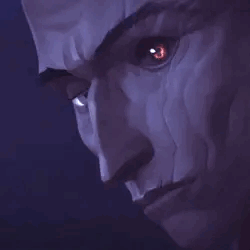
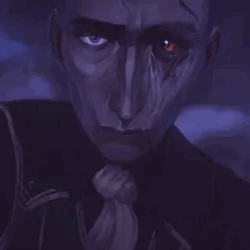
Obsessed with these two GIFs because this is just..ugh.
Silco is a man that has committed his whole life to the cause. He lost his ability to trust after Vander tried to murder him, lost his ability to allow himself to relate to any fellow GROWN ADULT on a deeper level. He has clawed his way out of the mud to be respected and feared by anyone who meets him. He is a goddamn crime boss with plans for libertarian revolution of Zaun. Everyone must take him seriously. That’s how you keep the air of power around you. It’s as much projection as it is real follow-through.
But Jinx sees him in his private moments.
They are at the river, and Silco prompts Jinx with the hint that he’s going to start a lecture by beginning with the ol’ River story. Jinx pokes fun at the fact that apparently he has told the story of Vander’s betrayal to her many, many times, and what does he do? He only gives her a small smile.
It is a very subversive domestic moment between the two, a “Daaad I heard this story a hundred times”, except instead of this being some silly story about whatever it is normal law-abiding Dads typically like to tell stories about, it’s the traumatic event where Silco was almost murdered by a man he loved and trusted. It is not a normal story. It is not a good story. It is but one example of not only how dreary the world they live in is, but their relationship being an unconventional one forged by unhealed trauma. It is not something people typically joke about. It is discordant to us, but to them it is normal. Trauma destroys normality and reforges it with new parameters. They are operating within those parameters. It reaffirms that Jinx and Silco are removed from what good mental health, good living (state of being) is. But this odd display does not alienate the audience, but instead shows that they have found comfort and solace in the other. They hold the other’s trauma and trust the other not to stumble with it. To them, that is one of the greatest, most unquestioned expressions of love they can conceive of to give the other. Vulnerability.
So Jinx is poking fun at how traumatic it was for him, and Silco, SILCO, only smiles at her. He doesn’t bristle at her playful callousness toward something very deep and personal to him. He doesn’t take Jinx’s barbs as an attack, or he simply does not feel them as he would if it were anyone else saying what she was saying. He just smiles at her knowingly, like he understands he can be a bit much.
There is a moment of such quiet humanness, of him accepting that something he is submitting is not being taken seriously, and in the privacy of just the two of them, that is ok. His need for authority is not threatened by Jinx’s rudeness, because he knows that her nature is one that toes and skirts the line at any available opportunity. He allows this insubordination because it is natural of her. It is typical Jinx. And if anything she is mouthing off because she is nervous for what they are about to do, and he very much understands. He has always been gentle with her mental health. He would much prefer her sassy than miserable, cheeky than tormented. She is what Zaun could be. Bright and full of life. A threat to authority in the most audacious and creative ways. A genius that could shine for the world to see, if only they could let themselves see. She is the chaos he wishes for Zaun, the bright, inventive, brilliant ingenuity that lies beneath the rust and sewage and factory run-off.
Every fiber of his being believes that Jinx’s problem is that she is refusing to let go of her guilt and her past. She is not allowing herself to move on from what she has caused. We as the audience know that it is psychosis rather than a spiritual matter, but Silco doesn’t quite grasp that. Regardless, he thinks it is time for her to be set down the path where she confronts her two sides and washes herself of Powder. This baptism in the river is purposely blatant in its symbolism on Silco’s part. It is the most spiritual we ever see of him.
He holds her in that river, and as he gazes at her we see that expression on his face: It says,
I know you are scared. Scared of what you are feeling, scared of the past, scared you will never find peace. I know. I know what that fear is like. I see it. This is something I cannot shield you from. It is something only you can face. It will be difficult, but trust me, Jinx, trust me when I say that this storm will pass. You will rise stronger. I know you will. I am so very, very proud of you, my perfect, bright, brilliant girl. My daughter.
185 notes
·
View notes
Text
world building cause twn doesn't part 12: the hen ichaer
i realize i've been mentioning the hen ichaer without really explaining it, and for that i apologize. but without further ado, let's go
colour code cause i fucking love colour codes - already happened/introduced, probably s2, important background info, stuff that might be in the prequel, extras
series masterpost
general
the hen ichaer is basically a magical gene that originated with the elven sorceress, scholar, and princess, lara dorren aep shiadhal
it can lie dormant or inactive for generations, but when someone is an activated carrier of the gene, they are called a source
sources have an insane capability for magic, it's so intense that without instruction they are a huge danger to themselves and/or others. remember pavetta's betrothal feast? hurricanes should not happen indoors
same thing with ciri's sonic scream.
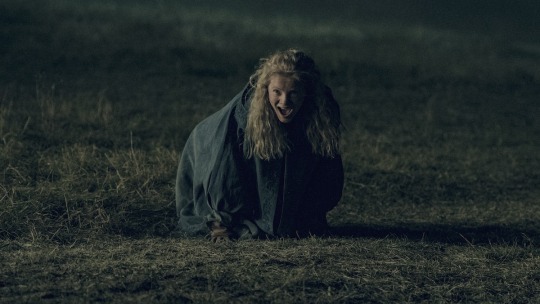
obviously, the hen ichaer is highly weaponize-able, but it's difficult to put this into theory since the magic is so strong that it can easily kill the person who carries it
most important is that the hen ichaer can open ard gaeth, the gates between worlds. you may remember that the witcher is a multiverse, and the continent is just one of countless worlds
aen elle
the aen elle, elves who live in another world called tir ná lia, controlled at least one gate that they used to get slaves from other worlds
however, this was before the hen ichaer was seriously studied. unicorns are also capable of opening ard gaeth, and were present in tir ná lia, so the aen elle would kidnap them to be used as their world-hopping-genocide key. yeah, the aen elle are seriously fucked
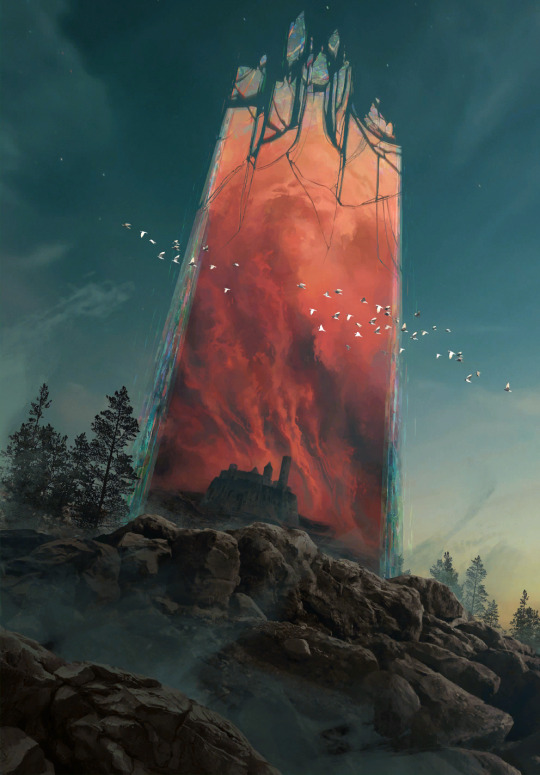
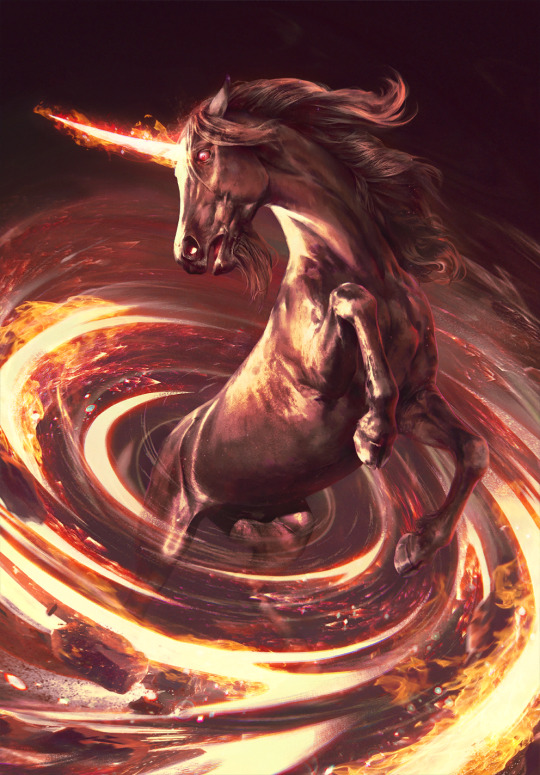
the king of the aen elle was named auberon muircetach, and he was very well known for his wars with the unicorns, who weren't too keen on being enslaved for the purpose of conquering other worlds
the hen ichaer came into play when auberon noticed that his daughter, lara dorren, had pretty intense magical abilities. like, ard gaeth opening abilities.
auberon, lara, and a few other elves began studying the gene and trying to figure out how it works and how to use it.
through this study is how we got the title aen saevherne, which is used to distinguish an elven mage with extensive knowledge of history, science, magic, and, most importantly, the elder blood.
both lara and auberon were aen saevherne, as was lara's husband-to-be, avallac'h, and avallac'h's foster son, caranthir ar-feiniel
ithlinne's prophecy
ithlinne aegli aep aevenien was an elven prophet known for her incredibly dark prophecies that she delivered at totally random times. how dark were they? ithlinne's prophecies were almost exclusively about the death of all humanity and/or the end of the world. she was fun at parties.
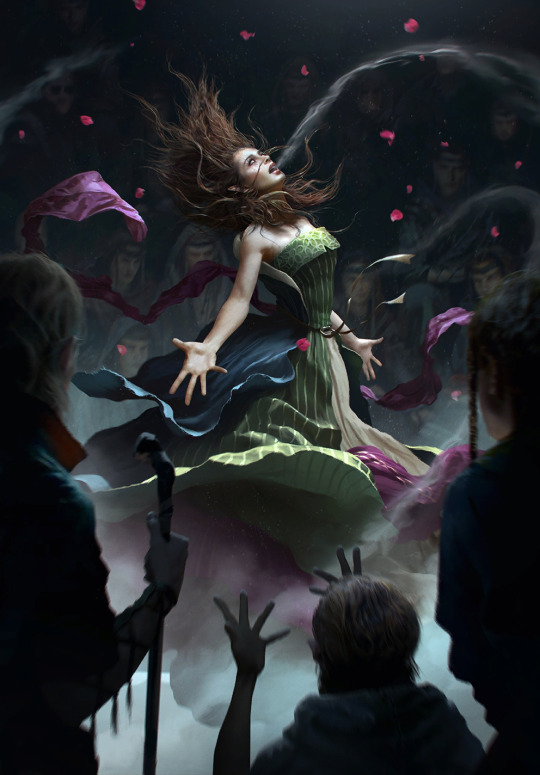
anyway, when we talk about ithlinne we really only mean one specific prophecy, aen ithlinnespeath. to be confusing it's usually referred to as ithlinne's prophecy
here's the prophecy itself:
Verily I say unto you, the era of the sword and axe is nigh, the era of the wolf's blizzard. The Time of the White Chill and the White Light is nigh, the Time of Madness and the Time of Contempt: Tedd Deireádh, the Time of End. The world will die amidst frost and be reborn with the new sun. It will be reborn of Elder Blood, of Hen Ichaer, of the seed that has been sown. A seed which will not sprout but burst into flame. Ess'tuath esse! Thus it shall be! Watch for the signs! What signs these shall be, I say unto you: first the earth will flow with the blood of Aen Seidhe, the Blood of Elves...
what does that mean? well, the white chill (aka the white frost) is a massive ice age that has been approaching the continent for years. don't believe me? the white frost has destroyed countless worlds in the past, and it literally cannot be stopped. the only way to save the world is by the power of the hen ichaer.
here's a perfectly frightening visual of the white frost
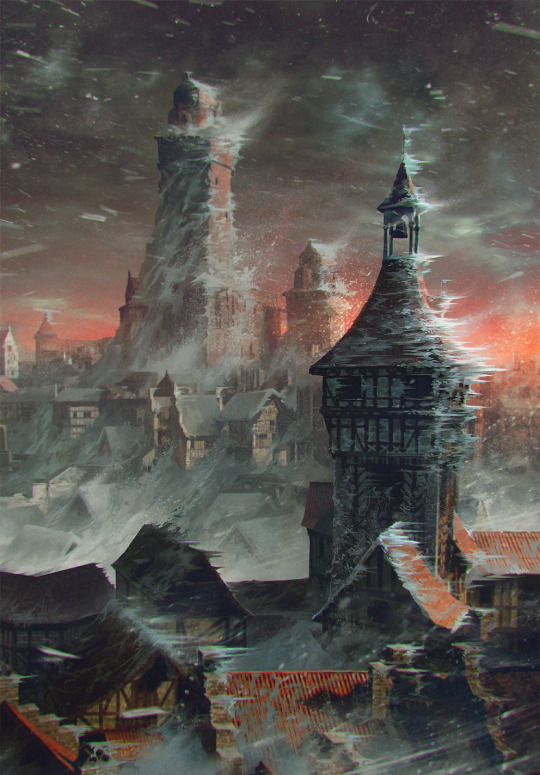
ithlinne didn't elaborate on the how, but we now know that the only to survive the white frost is by finding a new world and massively evacuating the continent through ard gaeth, which can only be opened by the power of the hen ichaer.
genetics
clearly, the hen ichaer is important enough to literally save, or end, the world, but the aen elle did a famously terrible job of studying it. like, you'd think they'd be good at that, but no. to their credit, it is a bit complicated
first, there are multiple types of elder blood genes, the main gene, the latent gene, and the activator gene. to actually show the powers of the hen ichaer, someone would need to either have one latent and one activator, or the main gene.
let's go back to secondary school biology for a second, remember punnet squares? these fuckers
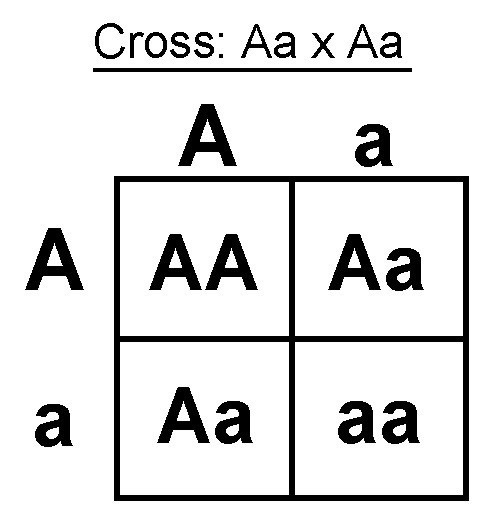
the letters in a punnet square represent a genotype, or the two alleles that are inherited from the parents. phenotypes, on the other hand, are what you see on the outside. for example, a genotype would be Aa but a phenotype would be brown eyes.
while the main gene is a simple dominant allele (shown by a capital letter on a punnet square), both the latent and activator genes are semi-dominant, meaning that when they meet they create a new phenotype: the innate magical ability that makes you a source.
it gets a little less scientific here so bear with me; this new phenotype is so powerful that it sometimes creates a whole new genotype. so instead of having one activator gene and one latent gene, the two would merge and you'd be left with only one (very powerful) main gene. this is the only single gene that actually has magic and it's a dominant gene, so you only need to have one to have the power.
but, the latent and activator genes don't always combine. you still have the full powers when they stay separate, but it is then less likely to pass the hen ichaer your children.
complicated? very much so. but in practice it's a lot easier.
for simplicity's sake i'll call the activator gene g/a, latent gene g/L, main gene g/m and a regular nonmutated gene g/r. to be a source, the genes you inherit would be g/a g/L, but they may combine to be just g/m. your average person would be g/r g/r and a carrier would be either g/a g/r or g/L g/r.
clearly, this makes tracking it pretty messy, since generations of people can be carriers without having a single source
tracking the hen ichaer
for now, let's do what those elven sages couldn't and track then hen ichaer, starting with lara dorren
eventually, lara met an exceptionally talented human mage, cregennan of lod, and they were lab partners (oh my god they were lab partners) in the study of the hen ichaer.
eventually, lara met an exceptionally talented human mage, cregennan of lod, and they were lab partners (oh my god they were lab partners) in the study of the hen ichaer.
for all the studying, lara and cregennan's own genes have always been something of a mystery. elven mages don't tend to have any issues with using themselves as lab rats, so it's entirely possible that lara and cregennan, knowingly or not, mutated their own genes in their research.
ultimately, it doesn't matter what lara and cregennan's genes originally were. by some happy little accident, the two eventually ended up with at least one activator gene and at least one latent gene between them.
later, when lara and cregennan made their own happy little accident, riannon, she inherited one of each gene (g/a g/L), making her a source. however, riannon's genes did not combine as the elves expected, which made her a little harder to study.
riannon eventually met king goidemar of temeria (g/r g/r), and they had two children named fiona and amavet. i'll start with fiona, who the aen elle managed to figure out had the latent gene, making her g/L r
fiona ended up having a baby with king coram II of cintra (g/r g/r), they named him corbett, and he inherited fiona's g/L and one of coram's g/r.
the aen elle lost track of the hen ichaer when they studied riannon's other kid amavet. see, amavet was kind of a whore. he had twins, muriel and crispin, with the married countess anna kameny. obviously, these children weren't legitimate, and when the angry count kameny murdered amavet a few months later, he was officially childless
the elves did, however, manage to figure out that amavet had riannon's g/a gene and goidemar's g/r gene. anna kameny was just g/r g/r, and crispin ended up being g/r g/r as well. destiny does favour the hen ichaer, but sometimes it's just not meant to be. muriel, on the other hand, did inherit her father's activator gene and was g/a g/r.
let's hop back to corbett, fiona and coram's g/L g/r son. he and princess elen of kaedwen (g/r g/r) had a son, dagorad, who got corbett's latent gene and one of elen's regular ones, meaning he was g/L g/r
muriel married robert of garramore (g/r g/r), and their daughter adalia, the dramatically posed lady right there, had the same genetic combination as her mother, g/a g/r

this is where it gets even weirder
the lovely adalia married dagorad. her second cousin. they shared riannon as their great grandmother. feel better in the fact that it was not intentional, adalia's mother, muriel, was not officially riannon's granddaughter. no one would have even known, but adalia's g/a met up with dagorad's g/L in their daughter, calanthe
for the first time since riannon, the hen ichaer was back, and calanthe's parents genes combined to give her g/m g/r
while it took generations of destiny and accidental incest to make the hen ichaer happen again, now that calanthe had the main gene there was a 50% chance she would pass it to her child, which, of course, she did
calanthe and her husband roegner (g/r g/r) had pavetta, who inherited the g/m from her mother. no one knew about this until pavetta literally created a source hurricane, and was already pregnant
pavetta and duny's (g/r g/r) daughter, ciri, inherited the main gene from her mother and was a source.
sources
it's important to note that a source is not necessarily an incredibly powerful sorcerer, merely a person who has the genetic predisposition required to channel very intense magic
sources, like anyone else, can be bad students, allergic to potions, or just generally averse to magic on all levels except heredity. there is also no way to guarantee that even the most willing source will be good at using magic, in fact it's far more common that they will be really really bad at it. sources are extra susceptible to the chaotic state of magic in the world, and many end up pretty seriously harmed by it.
magical talent tends to make itself known in very emotional situations, like the death of a parent or a war. the same applies for sources, but they have an extra rule: their full powers are off limits until they lose their virginities
now, netflix has not mentioned that rule to be true or false, but i'm going to think of it as strictly book/game/etc canon, because ciri is 10 years old when netflix shows her using her source powers for the first time
the virginity rule makes things even more complicated, as customs about premarital sex are pretty strict in the witcher world (well, among nobility), and the dudes didn't seem to have fast reflexes. what i'm saying is that getting pregnant the first time you had sex was not uncommon. sources couldn't even use, and likely weren't aware of, their powers until they were already passing them on to another generation.
and even still, there is no guarantee that someone who is a source will ever actually show their powers. calanthe had the genetics, but she wasn't a mage. what happened? we don't really know. after calanthe married, cintra was pretty peaceful; there were no invasions or massive upheavals that could put enough stress on her to show her powers. plus, her parents didn't know she had any magical powers, so they didn't give her the training that would develop them, and she was a very level headed person who would likely be unaffected by many of the things that would make another source lose their shit.
#the witcher#tw3#wild hunt#tw2#assassins of kings#twn#the witcher netflix#witcher netflix#witcher lore#ciri#cirilla fiona elen riannon#geralt of rivia#jaskier#geraskier#geralt x jaskier#yennefer of vengerberg#geraskefer#mine#lore tag#gen tag#haven't got a fucking queue
180 notes
·
View notes
Text
“To understand what friendship between women was, we must first understand what it was not. Before turning to the ways in which female friendship illustrated the play of the Victorian gender system, we must develop grounds for distinguishing it from other relationships between women. This is a detour, for the subject of this chapter is female friendship; erotic desire and marriage between women are the focus of subsequent sections. But friendship, erotic infatuation, and female marriage have so often been conflated, and women’s relationships so commonly understood as essentially ambiguous, that the detour is a necessary one.
The language of Victorian friendship was so ardent, the public face of female marriage so amicable, the comparisons between female friendship and marriage between men and women so constant, that it is no simple task to distinguish female friends from female lovers or female couples. The question “did they have sex?” is the first one on people’s lips today when confronted with a claim that women in the past were lovers—and it is almost always unanswerable. If firsthand testimony about sex is the standard for defining a relationship as sexual, then most Victorians never had sex. Scholars have yet to determine whether Thomas Carlyle was impotent; when, if ever, John Stuart Mill and Harriet Taylor consummated their relationship; or if Arthur Munby and Hannah Cullwick, whose diaries recorded their experiments with fetishes, cross-dressing, and bootlicking, also had genital intercourse.
Just as one can read hundreds of Victorian letters, diaries, and memoirs without finding a single mention of menstruation or excretion, one rarely finds even oblique references to sex between husband and wife. Men and women were equally reticent about sexual activity inside and outside of marriage. In a journal that described her courtship and wedding in detail, Lady Knightley dispatched the first weeks of wedded life in two lines: “Rainald and I entered on our new life in our own home. May God bless it to us” (173). Elizabeth Butler, whose autobiography included “a little sketch of [her] rather romantic meeting” with the man who became her husband, was similarly and typically laconic about a transition defined by sexual intercourse: “June 11 of that year, 1877, was my wedding day.”
The lack of reliable evidence of sexual activity becomes less problematic, however, if we realize that sex matters because of the social relationships it creates and concentrate on those relationships. In Victorian England, sex was assumed to be part of marriage, but could also drop out of marriage without destroying a bond never defined by sex alone. The diaries and correspondence of Anne Lister and Charlotte Cushman provide solid evidence that nineteenth-century women had genital contact and orgasms with other women, but even more importantly, they demonstrate that sex created different kinds of connections. The fleeting encounters Lister had with women she met abroad were very different from the illicit but sustained affair Cushman had with a much younger woman who became her daughter-in-law.
Those types of affairs were in turn worlds apart from the relationships with women that Lister and Cushman called marriages, a term that did not simply mean the relationships were sexual but also connoted shared households, mingled property, and assumptions about exclusivity and durability. We can best understand what kinds of relationships women had with each other not by hunting for evidence of sex, which even if we find it will not explain much, but rather by anchoring women’s own statements about their relationships in a larger context.
The context I provide here is the complex linguistic field of lifewriting, which brings into focus two types of relationships often confused with friendship, indeed often called friendship, but significantly different from it: 1) unrequited passion and obsessive infatuation; and 2) life partnerships, which some Victorians described as marriages between women. The most famous and best-documented example of a Victorian woman’s avowed but unreciprocated passion for another woman is Edith Simcox’s lifelong love for George Eliot, which has made her a staple figure in histories of lesbianism.
Simcox (1844–1901) was a trade-union organizer and professional writer who regularly contributed book reviews to the periodical press and published fiction and nonfiction, including a study of women’s property ownership in ancient societies, discussed in chapter 5. From 1876 to 1900, Simcox kept a journal in a locked book that surfaced in 1930. Simcox gave her life story a title, The Autobiography of a Shirtmaker, that foregrounded her successful work as a labor activist, but its actual content focused on what Simcox called “the lovepassion of her life,” her longing for George Eliot as an unattainable, idealized beloved whom she called “my goddess” or, even more reverently, “Her.”
Simcox knowingly embraced a love that could not be returned, though she was aware of reciprocated, consummated sexual love between women. Her diary alludes to a “lovers’ quarrel” among three women she knew (61) and mentions her own rejection of a woman who “professed a feeling for me different from what she had ever had for any one, it might make her happiness if I could return it” (159). Tellingly, though twentieth-century scholars often refer to Simcox euphemistically as Eliot’s devoted “friend,” Simcox rarely used the term, and modeled herself instead on a courtly lover made all the more devoted by the one-sidedness of her passion. Simcox defined her diary as an “acta diurna amoris,” a daily act of love, and aspired to keep it with a constancy that would mirror her total absorption in Eliot (3).
After bringing Eliot two valentines in February 1878, Simcox wrote: “Yesterday I went to see her, and have been in a calm glow of happiness since:—for no special reason, only that to have been near her happens to have that effect on me. . . . I did nothing but make reckless love to her . . . I had told her of my ambition to be allowed to lie silently at her feet as she pursued her occupations” (25). George Lewes, the companion whom Eliot’s friends referred to as her husband, was present at most of these scenes, and he and Eliot tolerated and even enjoyed Simcox’s attentions, which they consciously construed as loverlike.
During a conversation about Elizabeth Barrett Browning’s love poems, Sonnets from the Portugese, Eliot told Simcox “she wished my letters could be printed in the same veiled way— ‘the Newest Heloise,’” thus situating Simcox’s missives to her in the tradition of amatory literature (39). In private, Simcox indulged fantasies of a more sensual connection, reflecting on a persistent “love that made the longing and molded the caress,” and recalling how “[i]n thinking of her, kisses used to form themselves instinctively on my lips—I seldom failed to kiss her a good night in thought” (136).
In trying to define her love for Eliot, Simcox significantly refused to be content with one paradigm; instead, she accumulated analogies, comparing her love for Eliot to both “[m]arried love and passionate friendship” (60). Like a medieval ascetic, Simcox eroticized her lack of sexual fulfillment, arguing that her love was even more powerful than friendship or marriage because, in resigning herself to living “widowed of perfect joy,” she had felt “sharp flames consuming what was left . . . of selfish lust” (60).
In an unsent 1880 letter to Eliot, Simcox again found herself unable to select only one category to explain her love: “Do you see darling that I can only love you three lawful ways, idolatrously as Frater the Virgin Mary, in romance wise as Petrarch, Laura, or with a child’s fondness for the mother” (120). By implication, Simcox also suggested that there would be an unlawful way to love Eliot—as an adulterer who would usurp the uxurious role already occupied by Lewes. She concluded by explaining that her relationship with Eliot was too unequal to be a friendship (120).
In the absence of the sociological and scientific shorthand provided by sexology or a codified subculture, and in the absence of a genuinely shared life that could be represented by a common history or joint possessions, women like Simcox represented their unrequited sexual desire for other women by extravagantly combining incompatible terms such as mother, lover, sister, friend, wife, and idol. Other women deployed similar rhetorical techniques of intensification and accumulation to express sexual loves that were not equally felt and did not lead to long-term partnerships.
At age twenty, Sophia Jex-Blake (1840–1912), one of England’s first female doctors and an activist who helped open medical education to women, met philanthropist Octavia Hill (1838–1912). In a biography of Jex-Blake written in 1918 that still adhered to Victorian rhetorical conventions, Margaret Todd called her subject’s relationship with Hill a “friendship” but qualified it as one that made “the deepest impression . . . of any in the whole of her life.” Jex-Blake considered the degree of love she felt for women to be unusual, writing around 1858, “I believe I love women too much ever to love a man” (78).
During a brief relationship that Hill soon broke off, the two women may have been sexually involved, but even so their feelings were never evenly matched. During the period when the women were closest, Hill reduced their bond to mere chumminess by calling herself and Jex-Blake “great companions” (85). By contrast, Jex-Blake was in awe of Hill and described her as both child and mother, roles often eroticized for Victorians, writing in her diary of “My dear loving strong child . . . I do love and reverence her” (85). Even after the relationship ended, Jex-Blake thought of Hill as her lifelong spouse, referring twenty years later to the “fanciful faithfulness” she maintained for her first love, to whom she left “the whole of her little property” in repeated wills (94).
Like Simcox, Jex-Blake used intensified language to underscore the uniqueness of her emotions. When she described inviting Hill on a vacation that included a visit to Llangollen, a site made famous by the female couple who had lived there together, Jex-Blake wrote of her “heart beating like a hammer” (85) and then described Hill’s response: “She sunk her head on my lap silently, raised it in tears, then such a kiss!” (86). Female friends often exchanged kisses, but Jex-Blake’s account took the kiss out of the realm of friendship into one of heightened sensation. Although it was common for female friends to love each other and write gushingly about it, Simcox and Jex-Blake also wrote of feeling uncommon, different from the general run of women.
Simcox identified closely with men and Jex-Blake felt unable to love men as most women did; both were extraordinarily autonomous, professionally successful, and self-conscious about the significance of their love for women. Other women also had intense erotic relationships that went beyond friendship, but were less self-conscious about those relationships, which they rarely saw as needing special explanation, and which usually lasted years or months rather than a lifetime. An example of outright insouciance about a deeply felt erotic fascination between women is found in the journals of Margaret Leicester Warren, written in the 1870s and published for private circulation in 1924.
Little is known about Warren, who was born in 1847 and led the life of a typical upper-middle-class lady, attending church, studying drawing and music, and marrying a man in 1875. Her diary attests to a fondness for triangulated relationships that included an adolescent crush on her newlywed sister and her sister’s husband, and a brief, tumultuous engagement to a male cousin whose mother was the dramatic center of Warren’s intense emotions. In 1872, when Warren was twenty-five, she began to write incessantly about a distant cousin named Edith Leycester in entries that reveled in the experience of succumbing to another woman’s glamour: “Edith looked very beautiful and as usual I fell in love with her....Tonight Edith took me into her room. . . . She is like an enchanted princess. There is some charm or spell that has been thrown over her.”
Numerous similar entries recorded an infatuation that combined daily familiarity with reverent mystification of a sophisticated and self-dramatizing woman. Warren’s fascination with Edith lasted several years. Unlike Simcox and Jex-Blake, Warren never self-consciously reflected that her feelings for Edith differed from conventional friendship, but like them, Warren ascribed an intensity, exclusivity, and volatility to her feelings for Edith absent from most accounts of female friendship. Indeed, Warren rarely referred to Edith as a friend when she wrote of her desire to see Edith every day and recorded their many exchanges of confidences, poetry, and gifts.
Warren fetishized and idealized Edith, was fixated on her presence and absence, and used superlatives to describe the feelings she inspired. Within months of meeting Edith, most of Warren’s entries consisted of detailed reenactments of their daily visits and the emotions generated by each parting and reunion: “Edith was charming tonight and I was happier with her than I have ever been. She looked beautiful” (287). Warren created an erotic aura around Edith through the very act of writing about her, through a liberal use of adverbs and adjectives, and by infusing her friend’s most ordinary actions with dramatic implications.
Describing how Edith invited her to visit her country home, for example, Warren wrote, “Edith came in and threw herself down on the chair and said quietly and gently ‘come to Toft!’” (291). Although Warren got along well with Edith’s rarely present husband, Rafe, she relished being alone with her and described the awkward, jealous scenes that took place whenever she had to share Edith with other women (362, 369). Warren found ways to dwell on the details of Edith’s beauty through references to fashion and contemporary art. Like many diarists, Warren had an almost novelistic capacity to observe and characterize people in terms of prevailing aesthetic forms.
She described Edith with flowers in her hair, looking like a pre-Raphaelite painting, and recorded her desire to make images of Edith: “I sd. like to paint her. . . . It wd. make a good ‘golden witch’ a beautiful Enchantress” (290–91). A ride with Edith inspired Warren to pen another impassioned tableau: “All the way there in the brougham I looked at Edith’s beautiful profile, the lamp light shining on it, and the wind blowing her hair about—her face also, all lit up with enthusiasm and tenderness as she leant forward to Rafe and told him a long story . . . I . . . only thought how grand she was” (369–70).
Shared confidences about Warren’s broken engagement to their male cousin became another medium for cultivating the women’s special intimacy. By assuring Warren that she did not side with the jilted fiance´, Edith declared an autonomous interest in her: “‘I wanted you to come here because— because I like you.’ She was sitting at her easel and never looking at me as she spoke for I was standing behind her, but when she said ‘because I like you,’ she looked backwards up at me with such an honest, soft, beautiful expression that any distrust I had still left of her trueness melted up into a cinder” (290).
Just as Warren heightened her relationship with Edith by writing about it so effusively and at such length, the two women elevated it by coyly discussing what their interactions and feelings meant. Before one of her many departures from London, Edith asked Warren: “‘[A]re you sorry I am going? . . . How curious—why are you sorry?’ Then I told her a little of all she had done for me . . . how much life and pleasure and interest she had put into my life, and she said nothing but she just put out her hand and laid it on my hand and that from her means a great deal more than 100 things from anyone else” (293). Edith’s gesture drew on the repertory of friendship, but in the private theater of her journal, Warren transformed the touch of a hand into a uniquely meaningful clasp.
This is not to say the relationship was one-sided. If Warren’s diary reports the two women’s interactions with any degree of accuracy, it is clear that both enjoyed creating an atmosphere of pent-up longing. Edith fed Warren’s infatuation with provocative questions and a skill for setting scenes: “She asked what things I cared for now? And I said with truth, for nothing— except seeing her” (303). Three days later, just before another of Edith’s departures, Warren paid a call: When tea was over, the dusk had begun and I . . . sat . . . at the open window. . . . By and bye Edith came and sat near me. . . . The room inside was nearly dark, but outside it was brilliant May moonlight. . . . Edith sat there ready to go, looking very pale and very sad with the light on her face. . . . We did not talk much. She asked me to go to the party tonight and to think of her at 11. . . . She said goodbye and she kissed me, for the first time. (303–4)
Warren is exquisitely sensitive to every element that connotes eroticism: a darkened room, physical proximity, complicit silence, a romantic demand that the beloved remain present in her lover’s mind even when absent, a kiss whose uniqueness—“for the first time”—suggests a beginning. Any one of these actions would have been unremarkable between female friends, but comparison with other women’s diaries shows how distinctive it was for Warren to list so many gestures within one entry, without defining and therefore restricting their meaning. Warren’s attitude also distinguishes her emotions from those articulated by women who took their love for women in a more conjugal or sexual direction. Her journals combine exhaustive attention to the beloved with a pervasive indifference to interrogating what that fascination might mean.
Never classified as friendship or love, Warren’s feelings for Edith had the advantages and limits of remaining in the realm of suggestion, where they could expand infinitely without ever being realized or checked. Women who consummated a mutual love and consolidated it by forming a conjugal household were less likely to leave records of their most impassioned moods and deeds than those whose love went unrequited or undefined. Indeed, women in what were sometimes called “female marriages” (a term I discuss further in chapter 5) used lifewriting to claim the privilege of privacy accorded to opposite-sex spouses.
Like the lifewritings of women married to men, those of women in female marriages assumed intimacy and interdependence rather than displaying it, and folded their sexual bond into a social one. They described shared households and networks of acquaintances who recognized and thus legitimated the women’s coupledom, liberally using words such as “always,” “never,” and “every” to convey an iterated, daily familiarity more typical of spouses than friends.
Martha Vicinus’s Intimate Friends cites many nineteenth-century women who described their relationships with other women as marriages, and Magnus Hirschfeld’s magisterial, international study of The Homosexuality of Men and Women (1914) noted that same sex couples often created “marriage-like associations characterized by the exclusivity and long duration of the relationships, the living together and the common household, the sharing of every interest, and often the existence of legitimate community property.”
Sexual relationships of all stripes were most acceptable when their sexual nature was least visible as such but was instead manifested in terms of marital acts such as cohabitation, fidelity, financial solidarity, and adherence to middle-class norms of respectability. Because friendship between women was so clearly defined and prized, one way to acknowledge a female couple’s existence while respecting their privacy was to call women who were in effect married to each other “friends.” Given that “friends” was used to describe women who were lovers and women who were not, how can we tell when “friends” means more than just friends?
…There are many instances of published writing acknowledging marital relationships between women by calling them friendships. Victorian women in female couples were not automatically subject to the exposure and scandal visited on opposite-sex couples who stepped outside the bounds of respectable sexual behavior. Instead, many female couples enjoyed both the right to privacy associated with marriage and the public privileges accorded to female friendship. The Halifax Guardian obituary of Anne Lister in 1840 recognized her longstanding spousal relationship with Anne Walker by calling her Lister’s “friend and companion,” a gratuitously compound phrase.
Emily Faithfull, whom we will encounter again in chapter 6, was a feminist with a long history of female lovers. An 1894 article entitled “An Afternoon Tea with Miss Emily Faithfull” described her home in Manchester, decorated by “Miss Charlotte Robinson,” whom Faithfull readily disclosed “shares house with me.”80 Faithfull left all her property to Robinson in a will that called her “my beloved friend” whose “countless services” and “affectionate tenderness and care . . . made the last few years of my life the happiest I ever spent.” To call one woman another’s superlative friend was not to disavow their marital relationship but to proclaim it in the language of the day.”
- Sharon Marcus, “Friendship and the Play of the System.” in Between Women: Friendship, Desire, and Marriage in Victorian England
28 notes
·
View notes
Text

The finale of Ultimate Note airs 12/9 (tonight in China) for VIP. Thank you to this drama for bringing me my favorite Iron Triangle ❤ Longer discussion of why I love it so much, and why I strongly recommend it to book fans (especially those upset with certain previous adaptations) below the cut, apologies if it’s not fully coherent at times because I haven’t slept enough and also it’s almost 1am. But your TLDR is basically: characterization, plot, pacing, relationships are the best of any DMBJ drama. Iron Triangle especially.
First, the pacing of this show is excellent. Pretty much all cdramas I’ve seen or heard of have been inundated with filler, and the previous DMBJ dramas fall victim to this as well. Ultimate Note took 36 episodes to cover 4 book arcs, whereas previous adaptations have taken more episodes to cover far fewer. There’s really not any content you’d be wanting to skip, as almost all of it is plot-relevant or character-relevant.
Second, the plot is the most cohesive out of any DMBJ adaptation. Frankly, this isn’t saying too much, given the novel plot can also be confusing as all hell sometimes, but Ultimate Note goes above and beyond in pulling in information from later books and, if I heard correctly, common fan theories, doing their best to fill in the plot holes left by the author to create a more complete story.
Third, the female characters are actually done well. (As well as they can be, given the source material’s unfortunate habit of fridging its women.) For example, A-Ning’s decision to go the Tamutuo wasn’t because she was ~in love~ with some man. She is a determined individual who has made her choice about her path a long time ago, and she is willing to risk death to achieve her goals. Even her death was done about as well as it could have been--it wasn’t drawn out to the point of it being sickeningly cheesy, and Wu Xie tried his best to honor her goals and bring her to the Palace of the Queen Mother of the West (even emphasizing to Pangzi, “if you died, I would carry you too”). In addition, Chen Wenjin wasn’t stuck in some ridiculous love triangle. She loved Wu Sanxing, of course, but her loving a man isn’t made out to be her entire personality. Her goodbye to Xie Lianhuan is poignant but not mushy. She’s steady and sure in her goals, and she knows what she has to do in order to save herself. Yuncai’s character, as well, I think was handled about as well as it could’ve been given the source material. Her relationship with Pangzi wasn’t overexaggerated and nauseating, and I think their relationship was more tolerable in the drama than it was in the novel overall. (In addition, I prefer how they handled her death in the drama versus the novel--instead of just killing her offscreen, they give her a redemption, and show how she’d grown attached to her new friends, Pangzi especially, resulting in her hesitation to deal the final blow.)
Related to the above point: no added forced romances that destroyed the female characters’ personalities and reduced them to just love interests for men, thank god. Pangzi and Yuncai’s relationship was already there in the novel, but nothing about their relationship was distorted in the drama to the point of being annoying, and Yuncai is shown to have her own goals for cozying up to Pangzi (at first, at least). If you want to get technical about “added romances”, you could honestly argue that it’s Pingxie. (And Hei///hua, but I’ll be honest and say they’re not my cup of tea, so I won’t really be discussing them. However, I do think their characters, while also exaggerated for humor at points, were also done well, and their relationship--while AFAIK was not a really a thing in the books at all?--was written in a way that the development made sense, and their personalities compatible.)
But anyway, while Ultimate Note does make Pingxie seem closer to each other than they were in the novel, we do have to remember that the novel is from Wu Xie’s point of view, and he’s a little bit of a blockhead when it comes to noticing how much Xiaoge cares about him. (IIRC, he wonders if Xiaoge even considers him a friend in Zang Hai Hua...after Xiaoge’s literally called him his “only connection” to this world in book 8.) However, from an outsider POV, it’d be natural for us to see Xiaoge worrying more over Wu Xie. Because from Wu Xie’s perspective, what did he actually see? Xiaoge dropping in to save him a few times and often vanishing or turning away right after, leaving Wu Xie with mixed feelings and confusion about his value to Xiaoge. Xiaoge being aloof before they set off to Tamutuo, claiming that he is a person with no past and future, and that no one would remember him if he disappeared. (Xiaoge smiles before telling Wu Xie that he’s on Wu Xie’s side--that’s a smile that the viewers see, but that Wu Xie doesn’t.) Most of Xiaoge’s visible worry for Wu Xie in the desert was also when Wu Xie himself was not there to see it. During the scene where the fungus was growing in Wu Xie’s stomach, he was entirely out of it while Xiaoge visibly panicked about hurting him, and after the fungus was dealt with, Xiaoge only stood off to the side--only to smile faintly to himself, relieved, after Wu Xie wakes up. (Again a smile that the viewers see, but that Wu Xie doesn’t.) But because from an outsider POV we can see all this, while Wu Xie remains partly ignorant, lines like “thankfully, I didn’t bring death upon you” and Xiaoge calling Wu Xie is only connection to the world seem that much more logical, now that we can see some of the depth and development of how much Xiaoge does care about Wu Xie.
That brings me to the primary reason why I love Ultimate Note, because the main selling point for me on any franchise is not actually world-building or plot, but rather the characters and the relationships between those characters. And for DMBJ, the relationship I’m always looking for--and the relationship that the entire franchise ultimately centers around--is the Iron Triangle. And the mutual trust and the strength of the bond between this Iron Triangle is unmistakable; no one is treated as expendable.
As much as we have joked about Xiaoge's double standards with Wu Xie versus Pangzi, the end of the Banai arc especially and the last five episodes have cemented the importance of Xiaoge and Pangzi's friendship. Their relationship is often the weakest leg of the Iron Triangle in DMBJ adaptations, but Ultimate Note has nailed it. Pangzi helps carry Xiaoge out of Tamutuo, and Pangzi's the one who primarily takes care of Xiaoge after he loses his memories. There's also Xiaoge's clear worry over Pangzi after Yuncai's death, and his assurance that Pangzi won't die as long as he is here in the later episodes when the two of them are separated from Wu Xie--showing that the Iron Triangle is a triangle; Wu Xie isn't the single connection that Xiaoge and Pangzi's relationship hinges upon.
Pangzi and Wu Xie's friendship doesn't need much explaining: the two of them bicker like they're brothers, and they could probably star in their own buddy-cop comedy together. Both Pangzi and Xiaoge are shown to be clearly worried for Wu Xie after the Xie Lianhuan reveal, and even though neither of them quite know how to handle it, they are there for Wu Xie. And of course, there's the scene where Pangzi pours out the water while they're waiting for Xiaoge to leave the meteorite. Wu Xie cries for Pangzi when they're in the Miluotuo cave and he chooses to carry out Xiaoge first, and once again, his worry for Pangzi after Yuncai's death is palpable. Even when Wu Xie has to leave Pangzi in Banai, he instructs Xiaoge to look after him (not that Xiaoge really needed the instruction, anyway--that’s his best friend, too).
Wu Xie and Xiaoge's relationship needs even less explaining: anyone who's watched the show can attest to how much they care about each other. From Wu Xie's frantic scrambling to grab the tapes upon hearing they were from "Zhang Qiling" and Xiaoge's introduction in the show being him stopping outside Wushanju to stare up (longingly?) at the sign, we see their relationship unfold in all of its quiet pining and lingering looks. When Xiaoge claims no one would know if he disappeared from this world, Wu Xie doesn't hesitate in promising that he, at least, will. Xiaoge smiles before telling Wu Xie that he's on his side, and Wu Xie vows to walk with Xiaoge until the very end. During the entire Tamutuo trip, Xiaoge is visibly worried for Wu Xie--when the parasitic fungus grew in his stomach, that worry was the most clear. But Wu Xie worries for Xiaoge too: insisting on going to save Xiaoge from the snakes that night when they all went blind; swearing that even if he faces death, he would wait for Xiaoge to leave the meteorite; telling Xiaoge that he will take him home. (Related: the soft, almost vulnerable way Xiaoge tells Wu Xie “take me home” in episode 31.) Not to mention--even when Xiaoge loses his memories, he still remembers Wu Xie. (And Pangzi smiles knowingly right after that scene.)
There are too many character/relationship moments I could write about, but one that stuck out in particular was when they were facing the spiders, and Wu Xie stopped Xiaoge from cutting his hand and using his blood to make the spiders retreat. At this point, Wu Xie and Pangzi don't know the extent of how Xiaoge was (mis)treated as a child (and used as a blood bag, apparently), but they know about how "A-Kun" was captured used as bait. Wu Xie and Pangzi would never ask Xiaoge to bleed for them, no matter what. Not now, let alone 10+ years later. (I won't name names, but if you know what I'm talking about, then you know.)
Which brings me to my main point: the characters in Ultimate Note are the closest to their novel selves I have ever seen in a DMBJ adaptation, and this is objectively the best adaptation of the DMBJ novel. (Whether you prefer another adaption or not is your opinion--I absolutely love the Time Raiders movie, even though that plot is literally all over the place, and Xiaoge is decently OOC--but Ultimate Note is the best adaptation of the novel, and the characters are the most true to what they actually should be.)
You can see the innocent and naïve Wu Xie, but you can also see the developing confusion, frustration, and anger he feels because he's been lead around by his nose his entire life. And he is angry in the novel; he is a bit of a hot-headed bastard; he's not just a naïve child. I remember seeing some complaints that Wu Xie felt "OOC" in the first episode for being so furious with his San-shu, but I think his reactions were spot-on with how he felt, and how he wanted to react. A similar point is the scene where Wu Xie slammed Xiaoge against the car--aside from just being some fun fanservice, in the novel Wu Xie really was furious at Xiaoge for vanishing on him and never contacting him after leaving the Heavenly Palace in the Clouds. A lot of the novel is Wu Xie's inner thoughts, which are difficult to portray in a live action adaptation, but he really did pretty much want to pick a fight with Xiaoge about disappearing, and Ultimate Note decided on how to express this frustration in a way that suits a drama adaptation. In addition, you can see how Wu Xie’s past experiences like the trip to Tamutuo has changed him in how he manipulates Panma into bringing him to the lake; and you can see how almost losing Xiaoge and Pangzi to the Miluotuo changed him as well, when he thinks he’s lost them for real in episode 36 (leading up to his decision to put on his San-shu’s mask by the end, despite the fact that “some masks, when worn too long, can no longer be taken off”).
As for Pangzi: even though he has scenes that were clearly exaggerated for comic relief, he has plenty of moments that build his character and the Iron Triangle’s bond. These include him pouring out the water while he and Wu Xie are waiting for Xiaoge, his grief over Yuncai’s death, his standing by Wu Xie during the hotel auction scene, and his almost mother-hen-like worry about Xiaoge while they’re entering the Zhang Family Mansion in the last five episodes. Not to mention, he’s really quite a smart and perceptive character, despite his goofiness: he sees through Xiaoge’s worry about Wu Xie, and he knows when to step in and liven the atmosphere (see: Wu Xie being all awkward about his gift to Xiaoge in episode 31, and Pangzi being there practically just for emotional support). Also in episode 31: Pangzi telling Xiaoge that he’s getting more and more humane (the implications about Wu Xie here are pretty obvious). All in all, Pangzi is a funny person; he is often comic relief, but he’s also a steadfastly loyal friend and someone who loves deeply and without regret. Initially we saw more of his humor, but we definitely got the depths to his character by the end of Ultimate Note.
Finally Xiaoge, who I’m discussing last because he’s my favorite character: for once, I can see the humanity behind the title “Zhang Qiling”, and in a way that isn’t OOC. Xiaoge isn’t treated as a free source of bug-repelling blood; he isn’t treated as some overpowered, untouchable idol; he isn’t treated as a rescue machine for whenever another character needs it. He is a human, not a god. For the rest, I think his actor’s words speak for themselves. (And now I really don’t trust anyone else except him with Xiaoge's character.)

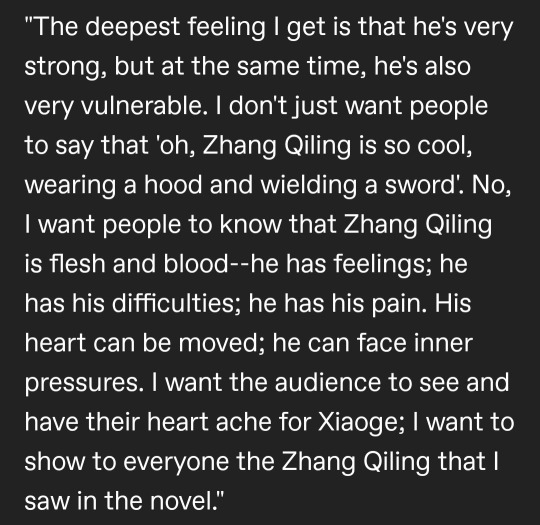
Ultimate Note succeeded in capturing the nuances of its main characters: Wu Xie’s loss of his “tianzhen” and slow maturation to the man he will eventually become by Sha Hai; Pangzi’s outwardly humorous pseudo-caricature but inwardly deeply loyal and loving spirit; Xiaoge’s vulnerabilities, painful humanity, and the “heart” given to him by his mother, hidden beneath a seemingly impenetrable armor. This is an Iron Triangle that feels like the Iron Triangle, without needing say so much in words. This is an Iron Triangle with mutual respect and a friendship I can see and believe in.
In conclusion: Ultimate Note does the story justice; it does the characters justice; it does the relationships justice; and it did all this with a low budget and almost no promotion. You can tell the crew definitely cares about the source material.
My only complaint is that they couldn’t film the finale.
Rambling over! All my love to the Ultimate Note cast and crew <3
#dmbj#zjbj#ultimate note#pingxie#iron triangle#盗墓笔记#终极笔记#瓶邪#the lost tomb 3#shouting into the void#i was supposed to be writing my essay for grad school LMAO#got 2.5k words of whatever the hell this is instead#basically iron triangle superior is what im saying#this is the longer and slightly more grammatical version of what i posted on twitter a couple days ago#FUCK I FORGOT TO TALK ABOUT PAN ZI#you know what its 1am im not editing this now lol
88 notes
·
View notes
Text
Bellamy Is The Abusive One, Not Octavia: A Rant/Meta
There’s two main “reasons” that people give when they claim that Octavia is abusive. That she beats up Bellamy after Lincoln’s murder, and that she has him put in The Fighting Pits.
Let’s start with the old discourse; Bellamy did get Lincoln killed, not Octavia. Bellamy is the person who got Pike into power, the person who stood by him even after seeing + being told multiple times by people he supposedly cares about that Pike was instituting facism and going to get everyone killed. Bellamy knowingly decided to be a Nazi even though he had other options and was aware of them. And, no, Nazi is not an exaggeration, Bellamy was 100% willing to wipe out an entire race just for being that race including putting them in concentration camp-like conditions to die.
Octavia is not at fault just because she didn’t accept Bellamy’s last minute “help”, he had given her absolutely no reason to trust him so it’s not her fault she didn’t. If my brother was fhe right-hand man of a fascist leader then I wouldn’t have trusted him that after he belittled my concerns several times and stopped me from escaping, he’ll get my boyfriend out of the camp he put him in to begin with. Octavia had no obligation to trust Bellamy after he did everything in his power to destroy her trust.
So, yes, Octavia beats up Bellamy. If I had just saw and heard the love of my life be murdered at the hands of the man that my own brother knowingly put in power then I probably would beat him up to. Especially if my brother had already been abusing me my whole life.
Side note: Let me also just point out that Bellamy was never adequately redeemed for that whole being a Nazi thing, everyone just pretended it never happened. Octavia herself even calls him out “You didn’t turn on Pike because you thought what he was doing to the grounders was wrong.” and he AGREES. Bellamy 👏 never 👏 earned 👏 redemption, because men in this show don’t need to be held accountable for their actions while women (mainly Octavia and Clarke) have to supplicate themselves to men and be dragged through the dirt mercilessly for every wrong breath they take.
The Fighting Pit issue is an even weaker example because Octavia didn’t put Bellamy in there because she was angry or wanted to (although she had every right to be) she did it because Bellamy publicly broke several laws and she would have completely undermined her own authority (and given special treatment, making her a poor leader) if she let him get away with treason, child endangerment, murder, and attempted assassination. Bellamy getting put in the fighting pit was a consequence of his own actions, one that he was well aware of. Octavia wasn’t being abusive, she was being a fair leader.
Now that that BS is out of the way, here’s a list of why Bellamy is abusive to Octavia:
1.) Bellamy has had all of the power in their relationship from day one. Octavia was literally trapped in a room and only able to interact with two people for sixteen years, Bellamy came and went as he pleased. Octavia was essentially a captive, she couldn’t have possibly been more powerless during the entire time their relationship was developing. Then when they get on the ground, Bellamy is almost instantly put in a position of power which he uses to isolate and control Octavia. There’s also the age difference, I think a lot of people forget that Bellamy is way older than all the other Skaikru. Bellamy is 23 at the start of the show and everyone else is under 18 (except Raven is 18). So, we’re talking about a barely 17-year-old girl, one who grew up extremely isolated so is even more immature than most kids her age, and a 23-year-old man who lived most of his life relatively normally.
The power difference entirely favors Bellamy. Octavia has no power over him at all pre-Blodreina (which we’ll get to that) so the idea that she could possibly abuse Bellamy is pretty absurd. Abuse is a habitual pattern of controlling and belittling behavior by someone with more (actual or perceived) power over another, Octavia had no power over Bellamy at all; Bellamy had an insane amount of power over her that he constantly abuses to isolate and control her.
2.) Bellamy supposedly goes to the ground to “protect” Octavia but his means of doing so are abusive and controlling. In season 1 alone; Bellamy uses physical intimidation and manhandling against Octavia several times, he terrorizes a harmless teenager (remember how he’s a grown ass adult? Yikes...) to keep him away from Octavia who was enjoying his company, then he tortures a man in front of her while she begs him to stop because he doesn’t care about her opinions (more in 4) and he’s the leader of The 100 so he can.
3.) The whole “my sister, my responsibility” thing that everyone thinks is so cute? Yeah, that’s emotional abuse. A figure of authority repeating to a child that they are a burden for existing is disgusting and so, so harmful. That phrase is a reinforcement of the more vicious things Bellamy has said “Mom was floated for having you, she’s dead because you’re alive!” and “My life ended the day you were born!”
4.) Bellamy is constantly belittling, dismissing, and patronizing all of Octavia’s opinions and identity.
“You turned this place into a story from your childhood. I mean, the red queen? It’s a joke.”
I’m not saying that Blodreina was a positive identity for Octavia, but it was something she was forced (remember, she didn’t seek power like Bellamy and Clarke did) to become to survive. Octavia was a mentally ill teenage girl with very limited exposure to the world who has never had any power in her entire life, and suddenly she was responsible for saving the human race. How fucking dare Bellamy mock her for basing her leadership off of stories WHAT THE HELL ELSE WOULD SHE BASE IT OF OFF???
Bellamy had a job and a life on The Arc, Octavia never left her room and had no way of seeing the outside world except through stories. She has literally no reference for ruling, or anything else, except those stories and her brief time with the Grounders. Fuck you and your privilege, Bellamy.
On top of that, Octavia actually did save the human race. That “joke” kept humanity alive.
“It is time to stop playing Grounder before you get yourself hurt.”
Yes, how dare she identify with the only people who have ever accepted her and treated her like a human being. How about you stop “playing” Nazi before you get us everyone killed. Seriously, Octavia is not allowed to disagree with Bellamy without him grabbing her arm and talking down to her like she’s a toddler throwing a tantrum.
5.) As soon as Octavia is in a position of power, one she didn’t even ask for, Bellamy’s abuse gets progressively crueler because he’s trying to regain control. He starts actively using Octavia’s mental illness against her and literally suicide baits her several times.
There is NO excuse. None at all. To tell someone who is severely mentally ill, traumatized, and an active suicide risk that “I wish you were dead” and “you’re already dead”. Trying to push someone to suicide and using someone’s mental illness to hurt them, let alone your own sister, is one of the most evil things you can do. The fact that so much of the fandom ignores this genuinely makes me sick.
Bellamy chooses those words because he knows that is what will hurt Octavia the most and he wants to hurt her. Bellamy has heard Octavia say that she’s already dead when she’s at her lowest points, he knows that those are the words that haunt her and drive her to want to kill herself, and that’s why he uses them as a weapon. Notice that he says them multiple times and at very purposeful times, this is not something he yelled once when he was angry; we see him calmly make the choice to say these things to her several times when he is losing control and wants to break her back down to the helpless little girl who was always happy to see him because of her Stockholm Syndrome.
6.) I think trying to MURDER Octavia THREE FUCKING TIMES deserves its own point. Bellamy poisons Octavia, he suicide baits her and let’s her go through with it (someone else stops her, Bellamy makes no move to), and then he leaves her to die with a lovely extra “My sister is dead” for the road.
7.) Octavia spends most of season 6 groveling and trying to “earn” back Bellamy’s love and we see clearly that “earning” Bellamy’s love means being utterly powerless and subservient. Bellamy loved Octavia when she was a captive little girl but suddenly he can’t produce an ounce of human decency towards her? And don’t give me some “but she’s Blodreina” like Mr. Nazi has any room to judge Octavia for becoming a dictator out of desperation when she didn’t know what else to do and she was forced in a very, very difficult leadership position that she never wanted and all of humanity relied on.
My point is basically that Bellamy’s love is conditional, he holds it over Octavia’s head like a fucking dog treat. He wants “his sister” back but what does that mean? He wants back the scared little girl who couldn’t leave one room and was entirely dependent on him. It’s Octavia having autonomy that Bellamy hates, not her being “evil” because Bellamy is 500x as evil as Octavia and I will die on that hill. You’re telling me that Bellamy of all people is soooo upset that his sister was forced to kill some people in the context of war and keeping humanity alive? As if Bellamy isn’t a mass murderer who has killed way more people for way less. Give me a fucking break. “Octavia is dead” because Bellamy’s victim is dead and he can’t handle that.
But, please, do tell me again how two isolated incidents over six years apart from each other that are both the direct consequences of Bellamy’s autonomous choices make Octavia “eMoTiOnAllY AbUsIvE tO pOoR WitTlE BeLl”.
258 notes
·
View notes
Note
As-Salamu Alaykum Sir, I have too many sins and I have lost my hope to be a good servant again but I love Allah What should I do?
One is responsible for repenting regardless of the state he is in. Satan tries to hinder people from repenting by demotivating them. While repenting, one needs to improve his lower-self and advance.
The following verse is present in the chapter Aal-i-Imran
“And those who, having done something to be ashamed of, or wronged their own souls, earnestly bring God to mind, and ask for forgiveness for their sins, - and who can forgive sins except God?- and are never obstinate in persisting knowingly in (the wrong) they have done. For such the reward is forgiveness from their Lord, and Gardens with rivers flowing underneath, - an eternal dwelling: How excellent a recompense for those who work (and strive)!” (Aal-i-Imran, 135-136)
That is to say, it is essential that one must not insist on committing that sin without an excuse for a repentance to be accepted, for a sin to deserve to be forgiven. What happens if a person continues to commit something haram, to make excuses like not being able control his lower-self and being hesitated about how the people around him would react to it? The translation of a hadith on the issue is as follows:
“When a believer commits a sin, a black spot appears in his heart. If he leaves that sin and begs Allah for forgiveness, that black spot disappears. If he continues to commit that sin, that black spot grows bigger. This is what “sin covering a heart” mentioned in the Quran means. (Ibni Majah, Zuhd: 29).
Yes, the statement “Through every sin is a way that leads to unbelief” indicates a significant reality. That is to say, a person who continues to commit a sin, gets used to it in the course of time and comes to such a point that he cannot quit it anymore. That habit leads him to greater and greater spiritual dangers. He eventually happens to believe that there is not an otherworldly punishment for sins and Hell’s existence is unnecessary. It is possible that, God forbid, the seed of sin that covers a small place in one’s heart at first will sprout and grow into a tree of Hell at last. (Flashes, p. 7; Mesnevi-i Nuriye, p. 115.)
In order not to be subject to such danger and be deceived by Satan’s whispers, one needs to quit sins, which will require repentance right away and pull himself together.
What is the criterion of uttering one’s love for Allah?
As loving Allah and knowing that He is content with us is an abstract issue, it is difficult to comprehend it. One can say, “I love Allah”. However, as that statement expresses a feeling inside us, we need to externalize it.
On the other hand, is Allah really content with us? What kind of slaves are we in His eyes? Those questions are equally difficult to comprehend. There must be a way to comprehend them.
As a matter of fact, Allah informs us of the way, with which we can make our love for Allah understood and find out whether Allah is content with us, in the following Quranic verse: “O Muhammad, say: If you love Allah, follow me, so that Allah will love you.”
The indication of our love for Allah is practicing Islam by complying with our Prophet. We can say without hesitation that Allah loves us, if we lead our lives in accordance with the Prophet. For instance, how is your love for parents manifested? If you meet their wishes and quit things which they do not approve of, your love for them is manifested. And we understand that they love us too, even though they do not tell us. Contrarily, if you do not do anything they wish and still say, “but look at my heart I love them so much”, nobody will believe you.
We can deduce that Allah created the Prophet as an example for us and He manifested the most beautiful exemplary characteristics in him. And He said to us: “If you love me, comply with the Prophet I sent for you. Then you can know that I love you too.” In summary, the criterion of how much we love Allah is how much we resemble Prophet Muhammad. We can come to a conclusion judging by that criterion.
They are Quran and Sunnah, which are route maps for you, us and all humanity. We cannot suggest you anything other than those. That is to say; it is making the Quran and sunnah of the Messenger of Allah (pbuh) our guides, putting ourselves in line with them and contemplating by reading subjects and books about faith. It will be very beneficial for your afterlife if you can find books which tell about the Quran and faith or spend time with people who contemplate and evaluate those matters.
Performing prayers in time, avoiding major sins and performing tasbihat (glorifying Allah) after prayers will also lead you to maturity.
What does Selling of Soul and Property mentioned in the verse mean?
While the verse which is translated as “Verily, Allah purchased the souls and the properties of believers in exchange for Paradise” is interpreted in Nur Collection, an exemplary anecdote is given and in the anecdote this message is placed: “The devices in those factories will be operated in my name and on my workbench. And their costs and payments will increase from one to a thousand.” The Words
During a conversation with my friends, I asked them how much soil and water cost and I could not get an answer. When I asked how much bananas cost, they told me a high value. So, when soil and water enter a tree, which is a factory of Allah, they come out in the form of bananas and gain a high value. In the same way, we give grass to a live factory called cow and we get meat and milk from it. Common beets come out of factories in the form of sugar and flower pollens become honey in beehives.
If one gives his soul and property to Allah’s workbench of orders, drawing lessons from the innumerable cautionary scenes surrounding him, he will be elevated to that supreme position called “ala-i iliyyin” (the highest of the high ones) and will have the honor of being one of the dwellers in Heaven.
In Nur Collection, a significant lesson of truth is given by stating: “unbelief destroys the essence of humanity and transforms it from diamond into coal”. That is to say, humankind is created in the best stature (ahsan at-taqwim) like a diamond. If he strays away from the allowed way, the straight way, he is degraded to the lowest position as a punishment. That degradation is symbolized with “coal”. According to scientists, the main stone of both coal and diamond are the same. The only difference is in their way of crystallization. And from this difference, come out two opposing qualities. Just as different words can be written with the same letters, so too can reverse fruits come out from the same essence of humanity such as: believer-unbeliever, righteous-sinful, just-unjust, and modest-proud.
According to this exemplary anecdote:
The best stature: “state of being created as capable of writing the best”
The highest of the high: “the supreme position of those who can succeed in the previous one”
The lowest of the low: “the great fall and destruction of those who fail to write correctly”
The Messenger of Allah says: “The world is the field of the Hereafter”. In this sense, one needs to reach to the highest of the high, at least as a seed, in the worldly life so that it can manifest itself as that supreme position in the Hereafter. And one will deserve the position of the lowest of the low by committing sins and it will bear the fruit of that severe agony of punishment.
In summary: Both high people and low people grow in this world. And everyone tastes bliss or punishment in the afterlife based on their own deeds.
#Allah#god#islam#quran#muslim#revert#convert#revert islam#convert islam#reverthelp#revert help#revert help team#help#islam help#converthelp#prayer#salah#muslimah#reminder#pray#dua#hijab#religion#mohammad#new muslim#new convert#new revert#how to convert to islam#convert to islam#welcome to islam
3 notes
·
View notes
Text
A Girl’s Gotta Have Guts
Arakawa once said that a great manga artist is “someone who can find the perfect balance between complying with readers’ expectations and betraying said expectations.” Arakawa seems to employ this philosophy in her own work to challenge her audience’s expectations about gender.
While her stories employ some gender tropes that are commonly present in shonen manga, action stories, and coming-of-age stories with male main characters, she also (whether consciously or not) confronts quite a few clichés and tears them apart with her narrative. By doing this, she subtly encourages her readers, mainly young boys and girls, to challenge the stereotypes about women that they see in other fiction or even in real life.
Arakawa once stated, “Our family motto is ‘those who don’t work, don’t deserve to eat.’ Everyone has to work hard to make ends meet, including women and kids. That’s the reason there are so many working women in Fullmetal.”
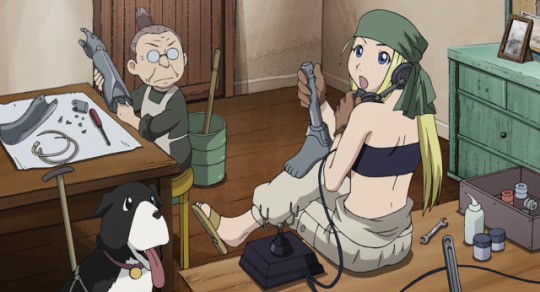
She points directly to Winry and Pinako Rockbell from Fullmetal as an example of this. The grandmother and granddaughter are skilled mechanics who run their own automail business, which the main character of Fullmetal depends upon. Since Winry builds and provides maintenance for Ed’s limbs, Ed owes his mobility and ability to do alchemy to her. The mechanic profession is shown to be male-dominated in Fullmetal, like it currently is in real life, yet Winry thrives in her career and is incredibly accomplished. She even strikes out on her own at age 15 to establish herself in a busier area and have a wider range of customers.
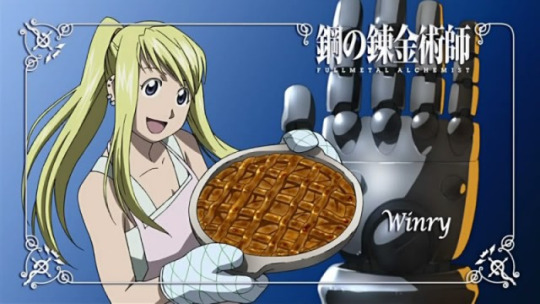
Winry is a tough mechanic but also a very nurturing, emotional person. She’s shown to enjoy baking and be domestically skilled. Since Winry has medical know-how and puts Ed’s limbs back together when they break, in some ways she is in the traditional “civilian healer” role women tend to occupy in action stories. But the work Winry does as a healer is shown to be just as impressive and important as the daring deeds that Ed and Al do, and perhaps even more admirable.

A huge theme of Fullmetal Alchemist is the power to create versus the power to destroy, and as someone who builds new limbs for people, Winry is the embodiment of the former. Winry’s “traditionally feminine” work as a healer is shown to require just as much grit as anything Ed does. A scene where she prepares to deliver a baby in the 2009 Fullmetal anime is accompanied by epic fighting music to underscore this point.

Ed often admires Winry’s skill and ability to save lives. He notes she is able to do what he with his alchemy can’t—bring human life into the world. In many ways, Winry is our protagonist’s hero. She is what he aspires to be—a human who creates rather than an alchemist who destroys. Through Winry, Arakawa challenges the idea that women who aren’t action heroes have less value than those who are.
Giving the Civilian Female Character Her Due:
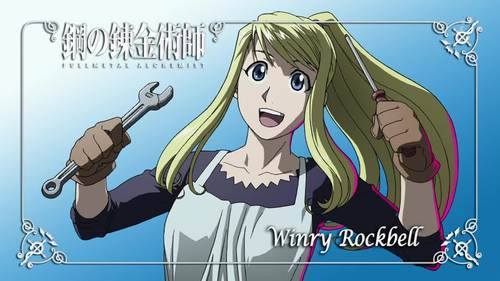
Everyone’s probably familiar with the trope—the superhero’s girlfriend or female relative provides endless support, yet the protagonists don’t ever have to consider her problems. She exists for them, and her life outside them is not of consequence. Not only that, the protagonists don’t see fit to tell her their secret identities, what they’re doing, or even let her in on things that directly affect her (like the threat of villians coming for her). And all for her “protection.” Arakawa presents a similar situation, with the boys depending on Winry but keeping things from her, but then smashes it apart by showing the consequences of treating someone this way. Winry is vocally upset about the boys leaving her out. A huge part of Ed and Al’s character arcs are about how they need to realize that shutting Winry out “for her own good” is hurtful and disrespectful.
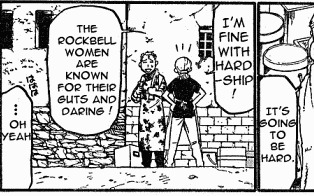
Moreover, it is fully acknowledged that Winry has her own problems to deal with—she struggles with her identity and finding the right path to take in dealing with the loss of her parents. Arakawa makes a point that because of this, Winry can’t just function as constant emotional support without getting any from the boys in return. Arakawa takes great pains to show that while Ed and Al are a big part of Winry’s life, she has a fulfilling existence outside of them. The fact that Winry has her own career, acheivements, and a community that depends on her is what keeps her going.
Essentially, Winry is the hero of her own story. Through Winry, Arakawa encourages her male readers to be more respectful of the women in their lives. She also encourages her readers not to see women as an endless source of emotional healing and support, but as complex people with their own lives and goals who also require support at times.
Promoting the Importance of Emotion and Communication:
Arakawa’s work challenges another common cliché: the idea that it is better not discuss your feelings and that “real men” don’t show emotion. Early on in Fullmetal, a male character tells Winry that the reason Ed and Al don’t talk about their feelings is that “men speak with their actions” and “hide their pain so as not to burden their loved ones.”

However, Winry proves that her way of handling things—by actually communicating her feelings—works a lot better than that macho nonsense. She ends up resolving a conflict with communication. She informs the male character that sometimes you do need to communicate with words, and he agrees with her. Arakawa explicitly shows that the more “feminine” method of being open about your feelings actually gets things done, and that burying your feelings hurts your loved ones more. This is a really good lesson for young people to learn, especially boys, who are often taught to be ashamed of their emotions.
Challenging the Damsel in Distress and Lack of Female Agency:
The “damsel in distress” trope is incredibly common in action stories, especially ones with a male protagonist. A female character close to the hero will be put in peril in order to motivate him. The villain in the story often does this knowingly, seeing the woman in question as nothing but an object to use as leverage against the hero. The narrative will often back the villain up in this—the female character may protest or fight, but ultimately she will fulfill her function as a motivation for the hero. Arakawa encourages her readers to question this particular trope by putting it in play and then tearing it apart. In Fullmetal, the villains threatens the women close to two male protagonists—Winry is threatened to force Ed and Al’s hand, and Riza is threatened to force the hand of her partner Roy Mustang.

However, not only do both women engineer their escapes, they turn the hostage situation to their advantage and save others. It initially looks like Winry has been kidnapped by another faction, only for it to be revealed this was a clever trick Winry engineered to fool her captors and allow her allies to escape. Winry recognizes that her captors see her as a victim without agency and turns this into their downfall. Arakawa even frames the narrative in a way that forces the reader to feel foolish for assuming Winry was helpless. Riza, on the other hand, uses her position as a hostage to gather intel for the resistance.
The most important thing about these situations is the female characters are ultimately put in peril to further their stories more than those of the male characters. Winry’s hostage situation is largely a device to bring her into a confrontation with her parents’ killer, and her story takes center stage during this confrontation, with Ed and Al acting as her support.

Moreover, in taking control of the situation, Winry is finally able to confront her fear of being a burden to her loved ones, resolve her issues with feeling helpless, and even figure out her identity. It also shows Ed’s positive development in that he doesn’t prevent Winry from making her own choices out of a desire to “protect” her.
Source: https://www.themarysue.com/hiromu-arakawa-part-three-women/
#Winry Rockbell#winry protection squad#edward elric#Alphonse Elric#Fullmetal Alchemist#hiromu arakawa#manga#fma
84 notes
·
View notes
Text
MCU Breakdown: Trying to forget Age of Ultron is something that happened Part 2 of 3
And I’m back for the 2nd level of Hell. And yes, I broke it into 3 parts, because I was venting for so long, tumblr couldn’t catch up with me.
I’m terribly sorry it took me so long to wrap my head around writing this but honestly, this movie makes me so mad.
I will point out once again that this post is Brutasha-critical. Again, not because I have anything against that particular ship -or any ship in general- it’s just that as a Black Widow fan, I am of the opinion that the way the relationship developed in Age of Ultron was not believable, and it was unfair and out of character for both Natasha and Bruce, which is why I don’t like it.
Is anyone ready for this? No? Doesn’t matter, I’m here, you’re here, lets get this show on the road.
So, last time we saw Natasha, Marvel would have us think she is reconsidering her right to be an Avenger, because of what was done to her when she was young, and because of what she did as a child assassin and as a brainwashed spy for USSR.
Marvel also had us think that Natasha was seeking to get into a relationship with Bruce Banner, because she thought that loving another “monster” was the kind of love that she deserved, the kind of love she could reach for.
To be fair, considering the note the film ended on, I’d bet good money they were not sure exactly where they were going with the relationship.
In any case, I call bullshit on both those accounts btw, and I will explain why in excruciating detail.

Bruce -according to the MCU- was experimenting with gamma radiation, in an attempt to recreate the super soldier serum.He experimented on himself, and was turned into a creature that has no control over its actions and represented his inner anger and helplessness, feelings he carried into adulthood because of the abuse he suffered through as a child.
He still struggles to deal with the aftermath of his actions, and with his control over the beast that is the Hulk. He is out of balance and -quite naturally- is unsure, paranoid, volatile and vulnerable. He chooses to stay out of fights because he is not always in control of himself and his actions.
Natasha, after years of being under the control of others, has finally gained her freedom. She is not obliged to follow anyone's orders, and yet she chooses to be the hero and save the day, under a sense of obligation to the world, in an attempt to redeem herself for her actions.
She is aware of her weaknesses and strengths, has control over her feelings and actions, and yet while she knowingly chose to be who she is, after reliving those painful memories she is made to think herself unworthy of her position in a team of superheroes.
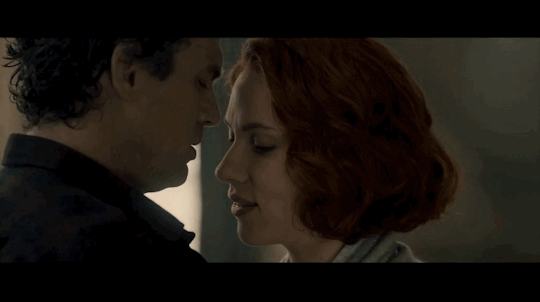
Can someone please point out the similarities between the two? Can someone tell me why a competent and stable individual who is following a long road of redemption like Natasha, would think she only deserves the love of a man who -while a perfectly good person- is unstable and has a lot of issues to resolve, just to get to a point where he is ok with himself?
And don’t misunderstand me, I would have no objection if it was a I fell in love with you while we were pulling a prank on Stark one lazy Sunday morning kind of thing. It is the whole “we are both monsters so we should be together” mentality I firmly object over. Natasha and Bruce are not alike.
The fact that this film draws parallels between Natasha and Bruce is an unfair, sexist and out of character treatment of Natasha, and the fact that the scriptwriters thought her as such, and wrote her as thinking of herself as such, without ever rectifying that statement during the course of the film is fucking sexist.
You don’t believe me? You think calling this treatment sexist is extreme? Let me get a bit out of subject and I will give you another example.
When Tony talked Bruce into making Ultron, does anyone remember what he said to him?

And yet, what is the outcome of their science? They create a murder bot, kill thousands of people and they almost destroy the planet.
Lets talk now about the repercussions of their actions.
Tony, a white, male, multi-billionaire, is never prosecuted. Even after the Accords are in place, even after Iron Man breaks the rules he put in place time and again, Tony Stark is never prosecuted. NEVER.
On the other hand:
> When Natasha lets Steve go after the airport fight, she is considered an enemy of state and she becomes an outlaw.
> When Natasha released all her secrets on the internet in order to destroy the nazi HYDRA/SHIELD, the work of another powered white male, she is put on trial.
What were people saying about Marvel not being sexist?

And lets not forget Bruce. Bruce has issues to work through, which is understandable, but what I get from all this, is that Bruce actually did run away, he did hide so deep in himself, Hulk was allowed to roam free for years, and Bruce had 0 control over him.
AoU isn’t fair on him either, because his character had a much different journey to go through, one of self-acceptance, and mixing it up with Natasha’s damaged both of their story-lines.
I find Bruce’s journey of self-discovery admirable, and it was satisfying to see him slowly working it out at the end of Thor: Ragnarok, and I liked the Infinity War Bruce a lot.
He let go of a lot of the burden he carried around, but the point is, Bruce never paid for his mistakes, and in the end he wasn’t able to do the heroic thing during the Age of Ultron story-line, he wanted to run.
(Why we had to go through an entire movie just for them to realize that hey, we are in different phases in life and we want different things is beyond me.)

Case in point: Natasha -unlike her male counterparts- is constantly called into account for everything that happens, and she has paid dearly for things out of her control, and she still chooses to be the hero time and again. Natasha has an endless supply of courage and inner-strength, she knows who she is, what she can do, and she puts all these things to good use. She deserves better than to be made to think that she is a monster, or that she doesn’t deserve to be an Avenger. Especially not when Iron Man gets to kill without repercussions and I will say this now:
If today’s Natasha, our self-assured master assassin, the heroic individual she has always been, who has achieved inner peace and has created deep connections of friendship and camaraderie with various characters, is pushed back to the Age of Ultron lovesick puppy story-line in Infinity War 2, I’m done, done, with the MCU.
Fucking sexists.
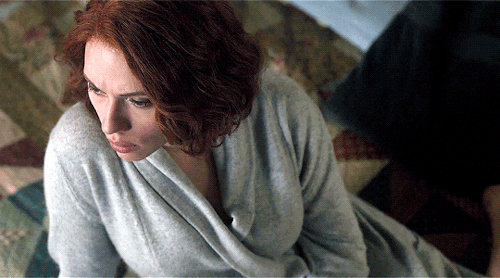
To get over this fucking scene, ok, I understand that the whole female reproduction system failure/I am a monster narrative was actually not written in parallel. Natasha’s point was that the people who tortured her were so sick, they actually took away a part of herself in order to achieve their goals. That doesn’t mean that said scene is not controversial, and it also doesn’t eradicate the fact that Age of Ultron tells us that the only thing that would make a woman run away from a life of abuse and crime would be a child, which is a sexist and immoral assumption, not to mention erroneous in so many ways, it is a completely separate discussion.
Stay tuned for the next part!
Links:
AoU Breakdown Part 3
AoU Breakdown Part 1
Civil War Breakdown
#black widow#natasha romanoff#character analysis#chauvinistic shit#MCU breakdown#MCU Black Widow#bruce banner#captain america#hawkeye#no matter what you think about the ships or the characters#this movie was a mess#honest to god#it was like an emergency mashup#such a disappointment
18 notes
·
View notes
Text
Worse than worse
Prompted by @ssree: A/B/O world where Bs are a neglected minority (A45/B10/O45), even if they're some of the most important members of society. Because Bs are immune to pheromones. Stiles is a B undercover spy. On a mission, Stiles poses as A/O (with fake pheromones, gotta love the R&D) and gets chosen by A/O Peter, who has issues with normal dynamic stereotypes (O's are airheads, A's are controlfreak douches) and Stiles doesn't set his hackles up like all the others. And Stiles just wants to complete his mission.
Peter is so, so tired right now. He has been for a while, actually. Of society, his family, his circumstances. So. Very. Tired.
The last thing he wanted was to have to attend a ball that will leave him with the same sour taste in his mouth as always in the end. Arrogant alphas, simpering omegas, all of them slaves to their own hormones and pheromones and no better than animals. No amount of alcohol can wash the foul taste that's already building in his mouth, barely one hour in.
Sadly, he had no say in the matter and here he is.
Then he spots him. He doesn't know what makes him pay attention, but he's glad anyways. The man is gorgeous, but that's not what catches his attention. What makes Peter giddy is the way he manipulates the alpha in front of him into snapping so badly that security sweeps in. Then the man feigns being horrified when Peter is sure he's ecstatic. It's beautiful and, since Peter has never been one to abstain from what he wants, he tells him so.
"So beautiful," Peter drawls and then he has to contain a delighted laugh when the man turns, a spark in his eyes that says that he's ready to destroy Peter.
Suddenly, Peter is not tired at all.
---
He called it.
Stiles fucking called it.
Did he say that loud enough for the ones in the back?
No?
HE CALLED IT.
There.
When he eventually gets out, he's going to repeat that until he loses his voice. And then he'll write it down, make copies of it and shove it in their faces. He'll let them keep their copy. Hell, he'll even frame it for them. The remaining copies will be stuck around the office, toilets included.
Because he called it, fuck dammit.
He said the mission was going to be the worst thing ever, and, just as he expected, this mission has turned out to be the worst thing ever. What's worse than the worst thing ever? Is that a thing? It has to be. Because once Stiles had to spend an entire week in the sewers and that was supposed to be the perfect example of the worst thing ever. And yet this is worse. So there must be a term whose definition is "worse than the worst thing ever".
And the mission isn't even over yet.
From bad intel to really bad luck, everything that could go wrong has gone epically wrong. (There's a horse hoof-shaped burn on Stiles' butt that's stinging like crazy, that's how bad the whole thing has gone! A hoof-shaped second degree burn! Stiles will have a hoof tattoo-like mark on his butt for who knows how long, fuck dammit!) Stiles is going to kill the intel and development people, he doesn't care if Danny or Lydia get pissed off for Stiles destroying their respective departments. This shit calls for retribution! The equipment failed, the intel was wrong, they deserve anything Stiles dishes out. Everything went wrong because of them!
Ok, fine, not exactly all. He's already gotten what he needed from his target's computer... even after said computer's OS crashed and nearly caught on fire. Physically. As in flames coming out of... Ok, whatever. Let bygones be bygones and all that shit. Stiles, hoof-shaped second degree burn on his ass cheek or not, needs to chill. He has the data and that's all that matters.
Now, he just has to figure how to send said data to base and then beat it. That would be wonderful. But, of fucking course, because this mission is the worst of the worst things ever, something is jamming the signal, which has made him lose contact with his handler and he hasn't been able to transfer it to headquarters. Sadly, that means that he has had to transfer the data to a memory stick (after having to patch the damn thing that was just seconds ago on fire with what he had in his pockets) and now he has to physically carry it outside the building. Which is no good but he'll have to make do.
He's taking a vacation after this.
(After making intel and development pay, that is.)
---
Just... fuck his life, ok?
His partner was able to slip out unnoticed but as he was trying to do the same, security showed up out of nowhere and he had to retreat towards a toilet or risk being caught otherwise. And sadly, an atypical and abrupt increase in security can only mean one thing: the breach has already been found out and they're trying to locate the source.
Maybe Stiles hasn't mentioned this before, but he really, really hates this mission.
(He has.)
(Like at least twenty times over the comms before he found himself alone.)
(After that he's been chanting it in his head.)
It's already been twenty minutes since that happened and he hasn't been able to leave yet, which just adds up to the shit-ton of things that have gone wrong in this operation so far. Right now, his only consolation for all his troubles is that Deaucalion and every single member of his merry band of human waste are going to be drawn out handcuffed in broad daylight when the bosses finally get their hands on the intel Stiles is carrying right now.
But first he has to leave this fucking place, dammit.
Which, again, brings him to his current situation, in which he's stuck in a ballroom, trying to make an alpha completely lose his shit out of sheer irritation and enjoying every second of it despite the dire circumstances. Now, Stiles would normally try to curve his vindictiveness when he's posing as an omega, but in his defense this alpha was asking for it. Begging. On his metaphorical knees even.
If there's a word Stiles despises, it's defective, with unnatural or it's various synonyms right after it on the podium. Especially so if they're being used to describe another human being. They get his hackles up and his level of viciousness goes first through the roof and then the stratosphere. Easily.
When he was a teen he would even get violent, but time (and the anger management therapy the State of California, his crying omega mom and disappointed™ alpha dad forced on him) toned down his knee-jerk reaction to those words. Don't get him wrong, his view on the whole thing is still pretty much the same, he has just learned to dish out his response in a much more undetectable and productive way.
Because, by definition of the majority of the population nowadays, Stiles himself is defective and unnatural. Doctors have tests to know it before babies like Stiles are born so that the parents can knowingly decide if they still want to have a Beta child or not. In some parts of the world people like Stiles are sacrificed, in others they have to be terminated before they're even born or face being persecuted and killed along with the parents that dared to defy the law and had them. Never mind that if an Alpha, an Omega and a Beta are examined side by side, physically speaking they are almost identical. The only thing that's different is that Betas can't produce any of the two kinds of pheromones or smell them when they're being emitted. That's it. The rest of their bodies work just fine. They have to eat, drink and sleep to survive just like everyone else. If they are female, they are perfectly able to get pregnant; if they are male, they can impregnate a woman. Just like every Alpha or Omega on the planet.
But again, since Betas lack of the equipment to process pheromones, don't go into a heat or a rut, and lack those instincts associated with them, they are defective. Hell, the very term "beta" is a slur that comes from the programming slang (first version of a program that has the necessary basics for it to run but it's incomplete). Betas may have made it their own, but that doesn't change its origins. That's the kind of world Stiles lives in.
And this asshole Alpha, who apparently also finds Omegas utterly vapid and vexing, has packed more Beta slurs in the twenty minutes Stiles has been there blending in than what he can stomach without popping a vessel if he doesn't answer somehow.
Admittedly, Stiles was running on a short fuse to begin with, but he knows he would have done this anyways because it may provide the necessary distraction to slip out unnoticed.
And no one beats Stiles at being an asshole, so by now he has lost count of the number of times he's had to bite his cheek and mask his glee covering his face coyly with his flute of champagne to avoid giving himself away. Asshole Alpha looks about ready to give in to the temptation of strangling him and it shouldn't be this amusing, but it is. Immensely so, in fact. Especially since Stiles is keeping up the hare-brained and innocent act flawlessly and drawing every single omega in the vicinity into the conversation, thus managing to crowd Asshole Alpha quite effectively.
A small pleasure in a completely shitty situation, that's exactly what this is. Now, if he could just leave somehow... But no, impossible. Security is still at every door and Stiles has no way of getting out without being caught with the memory stick and photographic evidence he has on himself.
Asshole Alpha finally snaps and lets out a threatening growl. Stiles forces himself to back off frightened instead of snickering delightedly, copying the reaction of every Omega around himself down to the distressed whimpers at the (he guesses by the reaction) onslaught of angry pheromones. Two guards swoop in almost immediately and make the man accompany them. He resists the temptation of waving cheekily at him as they drag him out and joins the horrified and appalled whispering left behind instead.
"So beautiful," someone drawls at his back and Stiles bites back an irritated groan before turning around to look at most possibly Asshole Alpha, take two.
His breath catches slightly when he takes in the new Alpha's appearance. Ok, wow. Asshole or not, that's one fine specimen of a man. Like, top model worthy wow. Stiles never thought he'd see anyone other than Tony Stark (who cares if it's a fictional character?) who would do justice to a goatee, but holy shit.
What. He may hate people and the dynamics they're run by, but that doesn't keep him from appreciating eye candy, ok? That's a completely different matter, after all. Also, eye candy or not, Stiles will destroy him anyways if he's a douche. It will even be sweeter, because good looking alphas are the epitome of privilege and the thought of being played by an Omega doesn't even enter the realm of possibilities for them.
"Hi," he chirps sweetly, looking at him through his eyelashes and tilting his head just so. Alpha's smile widens and Stiles fights a smug smirk. He's going to destroy him.
"Hello," Alpha purrs. "My name's Peter."
3 notes
·
View notes
Text
The Thing about Law that the Fandom Forgot
With more recent manga chapters revealing Law’s kinder, goofier side, a lot of people began envisioning him and portraying him as a charitable dork who’s genuinely kind but tsundere about it with everyone
And that’s fine and all, of that makes you happy, but it just kinda makes ME feel sad since it forgets and even contradicts some of my fave aspects of his character: his genuine selfishness, cruelty, and sadism
It was NOT a mistake that Doflamingo stated that the two of them were not so different, and it was NOT a mistake that Law begrudgingly agreed with this assessment
Because they both ARE selfish, cruel, and sadistic people
I mean, here are some things he does onscreen:
1. Asked X Drake gleefully about how many people he’s killed
2. Expressed great pleasure over committing all kinds of frightening body horror on Marines
3. Displayed excitement over the idea of performing excruciating surgery on Luffy and Jinbei, who couldn’t fight back (yes, it was overall kind since he saved their lives, but that doesn’t change the fact that he viewed doing painful things to them as a huge perk)
4. Needlessly and sadistically tormented Tashigi while she was down, insulting her and trying to chop her into bits in an attempt to humiliate her
5. Delivered 100 pirate hearts to the WG to become a Warlord
6. Took his damn sweet time in curing CHILDREN on PH, even though he could’ve done it in a matter of mere moments. He even suggested LEAVING THEM BEHIND since they were “too much of a burden to deal with.” (YES, he was disgusted by how Caesar treated them, I know, but it doesn’t change the fact that he didn’t do a damn thing about it and even suggested abandoning them to their horrific fates. And when he did, it was at literally the last moment and was mainly an “ugh, FINE, I GUESS I’ll do it since my ally wants it and I want to establish a good rapport with my allies” type of deal)
7. Planned to screw over every citizen of Dressrosa in his quest to avenge Corazon by killing Doflamingo. (YES, he was disgusted by how Doffy treated his citizens, but it doesn’t change the fact that he nonetheless knowingly tried to screw them all over in his revenge plot, which involved having Kaido come in and massacre thousands of innocent civilians in order to kill Doffy)
8. Outright stated that he would happily destroy the entire world, as well as himself, if it would help him avenge Corazon. In fact, his mere plan of killing Doflamingo showcases this conviction since, when Doffy did go down, it ended up plunging large parts of the world into chaos
9. While he does deeply value the sanctity of corpses (most likely due to Flevance and Cora), he CERTAINLY has 0 moral qualms with committing horrific acts of body horror on LIVING people
And this isn’t even taking into account the plethora of downright horrible shit he might’ve pulled offscreen
Like Apoo called him “infamously cruel” for a REASON
Really, overall, while Law can indeed be loving and kind, his love and care are EXTREMELY and OVERWHELMINGLY rare and selective
The only people he loves are his family, his crew, and, of course, his “most cherished person” Corazon. With them, he’s the dorky goof instead of the “Surgeon of Death.” And regarding this tiny circle of people, in great contrast to his general cruelty and sadism, he loves them to an absolutely obsessive, self-destructive, fervent, suicidal, crazed, and even FRIGHTENING extent, so much so that he’s willing to sacrifice the entire world as well as himself to avenge them/keep them safe. Like, he outright stated that he would joyfully destroy the entire world and himself to avenge Corazon. And WOW, don’t even get me STARTED on the shit he pulled on Dressrosa to avenge Corazon. He was pretty much well past the gates of death, but he STILL managed to stay alive and fight from the sheer force of the love he felt for Corazon. Even LUFFY–goddamn LUFFY–was intimidated when he witnessed just how much Law loved Corazon, THAT’S how overwhelming and scary Law’s love is for his few loved ones
• (This is actually kinda funny because his love for them is so strong that he ends up feeling fondness for THEIR loved ones as well, even if they’re his enemies and hate his guts. Like when he met Sengoku, Corazon’s adoptive father, he treated him with nothing but the utmost compassion and politeness, even when Sengoku was cussing him out, which–when you consider the fact that Law’s a very rude person–is a BIG DEAL)
And the only people outside of his circle of loved ones that he likes and tends to treat kindly are his close allies (the SHs, the Minks to a certain extent, etc). He also loosens up enough to be a bit silly and goofy with them as well. He treats them pretty well, views them pretty highly, and would, on certain conditions, risk his life for their sake (if his allies are risking their lives for a problem that’s his and not theirs, if one of them will die as a result of his issues, etc). Overall, he treats them pretty warmly, but he’s not nearly as kind to them as he is towards his loved ones
Everyone else? He’ll either go out of his way to torture you, or–if he doesn’t specifically go out of his way–if offered the opportunity to hurt you via a requirement of one of his plans, he’ll gladly take it up and view it as a major perk. And if on the off-chance he pities you, he’ll still screw you over and feel no guilt about it if it furthers his plans. Otherwise, he’ll p much only be kind to strangers if he thinks they’ll either be useful to him; be his allies in the future (for example, he saved Jean Bart, instead of any of the other slaves, because he knew he was strong); or if he respects them (he was p polite to Luffy and Kid back on SA, all things considered, since he respected them as fellow driven pirate captains)
So overall, unless if you’re his loved ones or allies, or if he thinks you’ll be useful or he respects you, Law doesn’t give a single FUCK about you and you’re SCREWED if he comes across you in a particular mood
In any other story besides One Piece’s morally ambiguous one, Law would be an unequivocal VILLAIN
And honestly, if circumstances were just a bit different, and if his goals didn’t end up generally aligning with those of the Straw Hats, Law could very well have been one of their greatest enemies
While thinking about him as such a cruel person might make some people sad, doesn’t it make Law a more fascinating and heartwarming character as well?? Isn’t it compelling and sweet how Law, one of the absolute cruelest characters in the series, is capable of the greatest love and kindness as well??
#sue me I /LOVE/ cruel bad guys who adore their loved ones with all their hearts and would go to frightening lengths#to make them happy/protect them#my stuff#trafalgar law#donquixote corazon#donquixote rocinante#donquixote rosinante#tw: murder mention#tw: death mention#tw: medical mention#tw: torture mention#tw: violence mention#op#queue#long post
2K notes
·
View notes
Text

Time to dive into this one, eh. This year’s SDCC poster now seems a pretty deliberate and blatant bit of foreshadowing and underlines this as a whole Thing we really should be paying attention to.
THAT ONE SCENE!!! Can I start you a gofundme account to destroy "WHO" did this to Pearl
Anon, I’ll do it for free. (Though, okay, yeah, if it requires a functional FTL spaceship, and it probably does, I might need help with funding.)
Ok but I really need you to develop your theories and thoughts about THAT thing with pearl because I can't stop thinking about it and I'm very curious to read what you think. I read your tags but I need more. All of it. There wasn't enough Pearl on those episodes and yet that thing messed me up.
You and me both.
See, I feel nostalgic now, like the ol’ days of SU theories, Ronaldoing hard, building entire alien worlds and systems and elaborate secret identity conspiracy theories on a few frames of background art with three triangles and four rhombuses. Love it. Or the incredible mileage we all got out of Jasper’s “some lost, defective pearl”, leading the way to the pretty wide agreement of there being multiples of a single Gem “type” way, way before the show actually confirmed it.

So, Homeworld... I always hoped you'd see it some day, but I thought I'd be there with you. Being taken there as a prisoner, I suppose it was something of a dramatic experience. It's just... Steven, I'm sure you have a lot of questions you'd like answers to, like about the Diamonds, for instance. There are things that are impossible for me to explain... But I want to! I-- Steven, I--

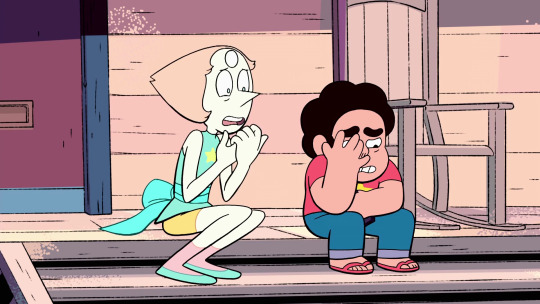
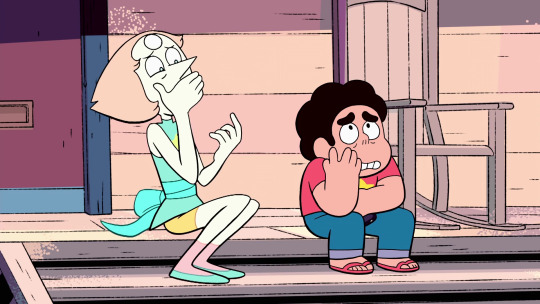

The way Pearl’s signature piano in the background music goes all wild and dissonant whenever her hand flies up is particularly effective.
So, what’s going on here? Is Pearl under some sort of geas? A gag order? From the elusive White Diamond (still without even a namedrop - maybe exactly because of... this), or some remnants of Pink Diamond’s influence? I’m fairly sure it’s another piece of the Pink Diamond Murder Mystery puzzle we’ve been promised, but how exactly it fits we can’t yet know for sure. There seem to be some very particular things Pearl physically cannot talk about as her own hand flies up to gag her, and she can’t wrestle it off to finish her sentence. She only manages to remove her hand once the topic of conversation has shifted away from whatever it was she was trying to say.
I’ve seen people compare this to Sophie being forbidden from talking about her curse in Howl’s Moving Castle, especially since:
If you ever find yourself wondering if Steven Universe just referenced anime, the answer is almost always 'Yes.' -- Matt Burnett
There’s also the possibility of it being a conditioning, or “programming” thing. Perhaps one that applies to Diamonds’ pearls, or pearls in general, which certainly makes a dark sort of sense. After all, as we’ve seen, pearls are privy to pretty much everything on Homeworld, down to the top dog rulers’ most private moments. They present a huge risk and potential vulnerability - and I’m sure I’m not the only one who’s noticed they’re the ideal spies and informants. I’ve also seen the suggestion that it’s some kind of trauma-related response (though the whole bit with literally wrestling with her own arm makes me a bit doubtful).
I’ve got a vaguely chronological overview of instances of Pearl doing the hand thing I’ve found and their context, in an attempt to see which might be relevant here and which are just Pearl being upset or shocked or similar. Obviously, YMMV, but this is my take. It’s also going to be pretty long since, well, she actually does it a lot.

Season 1, So Many Birthdays. Shock upon seeing Steven suddenly aged into an old man. Can’t think of how this would be related to anything.
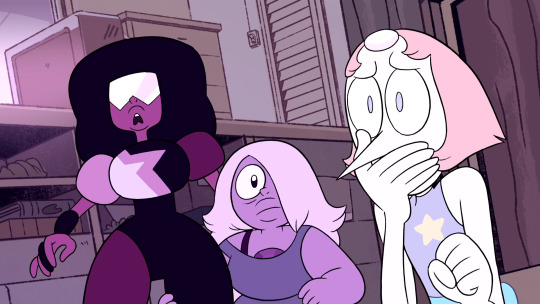
Season 1, Mirror Gem. “It's talking to him? It shouldn't be able to do that. I-it should only be following orders...”
While the above line has always struck me as interesting and kinda twisted in retrospect coming from Pearl of all people, the gesture is nothing like the involuntary gag one we’ve now seen, and there isn’t much to suggest she was about to say anything revealing or important in a Diamond sense.
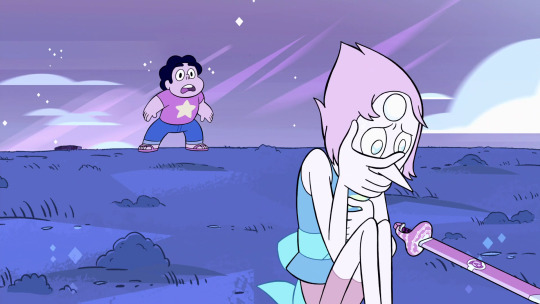
Season 1, Rose’s Scabbard. “Pearl, you have to tell me what's wrong.”
While tempting, I don’t think this one is it, either, especially because she does tell Steven what’s wrong right after and without any noticeable issues, and here she’s just curling into herself and crying, immensely upset. There’s also nothing to suggest anything “forbidden” at risk of being revealed here. (In general I think Season 1 might be a bit too early to start seeding this, but who knows, the Crewniverse have played the long, long, long game with us before.)
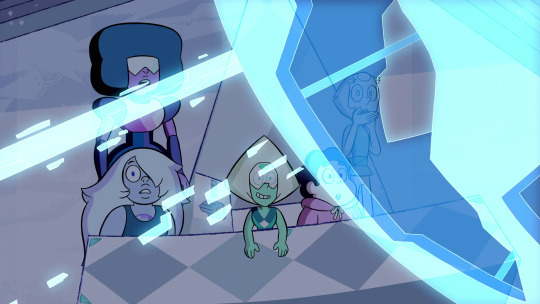
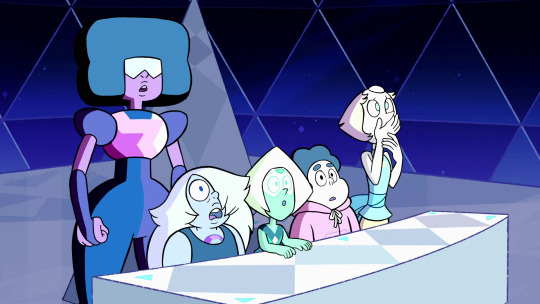
Season 2, It Could’ve Been Great. “Ta-da! A finished Earth colony. Wow, look at this! Eighty-nine kindergartens, sixty-seven spires, a Galaxy Warp in each facet, efficient use of all available materials. What were you thinking, shutting this operation down? It could've been great!”
I was pretty sure this one was going to be relevant, but then when checking it out I noticed the frames leading into it show Pearl slowly putting her hand up to cover her mouth in shock in a way that makes it look really different to the gag thing. And again, she doesn’t really try to say anything here, and a bit later joins the conversation without any apparent issue. So while I guess you could frame it as her wanting to say something about the Diamonds’ plans for Earth and being unable to, I’m not sure I would.
In season 3′s Monster Reunion, Pearl doesn’t cover her mouth, but does use a now interesting turn of phrase when discussing, as she calls it, “damage from the Diamonds”:
Remember, she's not cracked, she's corrupted, and that's something different, something nearly impossible to describe.
I guess there’s a world of difference between nearly impossible and outright impossible.
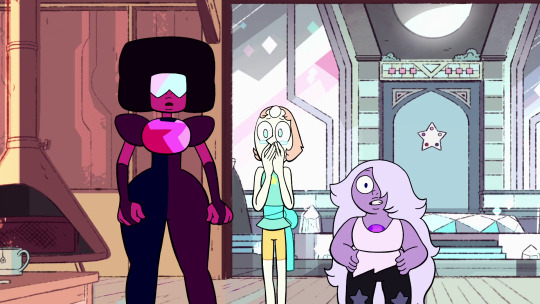

Season 3, Bismuth. These two instances I can’t see as being anything but emotion and shock, both at seeing an old, dearly missed and long-lost friend, and at seeing Steven hurt and said friend in a bubble. No dialogue involved (I mean, besides the BiiiIIIIIIiiismuUuUUUUUth, of course).
But then it really gets interesting.
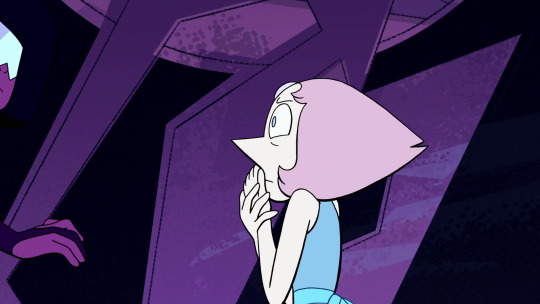
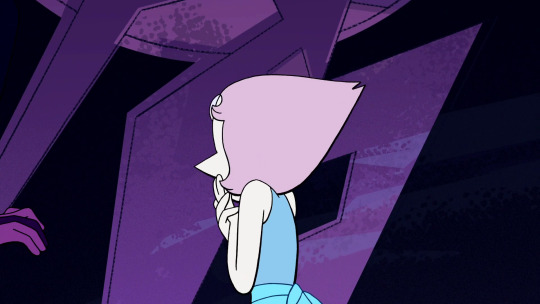
“I was there. I saw it with my own eye. I watched the leader of the Crystal Gems, Rose Quartz, shatter Pink Diamond!”

“No. Rose Quartz would never do that! A-and, sure, she had to fight, but - but she would never shatter someone!”
Season 3, Back to the Moon.
This is of course the one instance everyone and their mother thought back to after Gemcation, and I think the clearest contender for another example of the gag order thing. Garnet’s concern and look shot towards her is also very noticeable. The only issue I could possibly see is that here she’s covering her mouth with her left hand, whereas in Gemcation it was the right, but that’s fairly minor and deals with the specifics of something we really don’t have any knowledge about. But I’d say it’s a pretty fair bet that whatever it is Pearl can’t say has to do with Pink Diamond being shattered (also, interestingly, I checked again while going through the episode transcripts, but Pearl never once says the words ‘Pink Diamond’ out loud, where for example she has no trouble talking about Blue or Diamonds in general in several instances). Whether it was somehow Pearl herself or White Diamond or one of the many, many, many other variants of the whodunnit I’ve seen is still impossible to tell (and I still really really want it to be Rose, but hey).
I’ve seen people suggest that Rose is the one behind the gag order, or that a promise to Rose is stopping Pearl from talking, but the extent to which that flies in the face of everything the Crystal Gems fought for and represent makes me go nope pretty damn hard. It’s enough that after 5000+ years of being away from Homeworld and a free Gem Pearl still has to deal with this clearly very unpleasant (the way her entire body seizes up in Gemcation is just... jeez) reminder and problem, but Rose knowingly exploiting it would just be straight up evil.
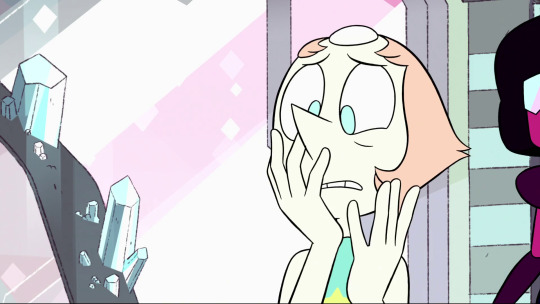
“I thought you were going to tell me everything from now on.”
“Oh, Steven... We...”


“Does this have anything to do with Pink Diamond? I already know mom shattered her, so what is it about this that you can't tell me?”
"Please, you're making Pearl very upset.”


“It's lucky something has some information that I don't have to get out of them!”

Season 4, Steven’s Dream.
I’ve included the whole progression here, from fidgety and increasingly uncomfortable and worried, looking to Garnet for help, to the hands firmly covering her mouth. I really really like this take on the scene by @mandareeboo and my read matches that one pretty well (and I’m generally in the camp that Garnet knows about... whatever this is, and Amethyst probably doesn’t).
The next episode, Adventures in Light Distortion, gave us this scene, which I feel is very relevant now. The long pause does look like Pearl might be trying to think of a way to go on without triggering the gag thing, so we get the very vague and general “... Homeworld”. Instead of, oh, don’t know... White Diamond, perhaps? (I don’t think it was Pink for a number of reasons, some of which I wrote down here, the timeline just doesn’t work out. Also if she’d been Pink Pearl, she would certainly have known the nefarious Zoo better than she does, and would have more than just “seen it [her]self” once or twice.)

Season 4, I Am My Mom. “I get it now. I'm the only one who can stop what she started. I can stop all of it! She wouldn't have wanted this. But I do.”
The final one I’ve found so far, and another one I won’t discuss too much since I think it’s an instance of Pearl being emotional and shocked, though I’ve seen the idea mentioned that she might have wanted to blurt something out to stop Steven from leaving, which, seeing as it’s clearly once again tied into Pink Diamond’s assassination, isn’t that much of a reach.
This might be reaching but what if,,,the white starburst design behind YD and BD in the SDCC poster is actually White, symbolizing her overarching influence? Like initially I found the 'floral design' a little weird in context of homeworld gems, but if WD's actually the case...
Oh, the white starburst on top definitely stands for WD, and the pink flower looks like (though isn’t identical to, I made a quick comparison here) the ones that grow around the palanquin in Korea and decorate the Zoo - that one stands for PD, that’s pretty deliberate (in the previous SDCC poster, Jasper had that flower on her lapel). They’re posed to correspond with their spots in the Diamond Authority insignia. Whether or not White does have some big overarching influence (and with that... huge... torso ship thing on Homeworld?), or if it all just matches their gem placements and nothing else, or some combination of both... your guess is as good as mine. Yellow and Blue seemed to be pretty equal in what we’ve seen of them so far.
@ayal92 asked:
I don't know how to feel about the gagging scene. On one hand, I think it's exactly what it looks like. On the other hand, Pearls being programmed that way means that Homeworld acknowledge their potential to screw their owners over, which seems very out of character for them. I always thought gems were fine being indiscrete in front of Pearls because they regard them as talking purses...
That’s the thing, though, you don’t even have to think a pearl would run off and spill all your secrets, or even consider her capable of basic disobedience. All that needs to happen is for your would-be political rival or whoever is plotting against you to steal your pearl and make her talk to get the blackmail material or whatever. I think pearls potentially just got “fancy encrypted hard drive” added to their list of horribly objectifying uncomfortable comparisons. Sticking tape over your laptop’s webcam? That kind of thing. Now you can be extra indiscreet and safe in the knowledge of no repercussions ever, no matter where your pearl might be! Hooray! Ick.
I think, personally, I’m leaning towards it being a pearl thing. It just fits with the awful Homeworld attitude in a way that I think really works and makes twisted practical sense. It also kind of reinforces, for me, the fact of just how badly Pearl had everything stacked against her, and she still did all that she did. Man, I don’t know, I just love her to bits.
#pearl#steven universe#steven universe spoilers#endless words#oathkeeper replies to things#theory post#meta#pearls#homeworld is horrible#long post#really goddamn long post#pink diamond#white diamond#WHO HURT YOU PEARL#oh and#in this entire giant endless thing i have not made a single joke about pearl clamming up#praise me and my restraint#'also' my lizard brain insists immediately 'think of the hurt/comfort potential'
837 notes
·
View notes
Text
Summer 2017 Anime Overview: Re: Creators
Okay, time to review our next batch of Summer 2017 anime. I watched 7 anime this season. I’ve been ranking them from worst to best. Previously, I reviewed what I considered to be the weakest anime I watched this season. Now that we’ve got that out of the way, we’re getting to anime that...well, kinda sits squarely in the middle of this season’s batch as far as “good”and “bad” go. I have a lot of mixed feelings and a lot of things to talk about. So let’s get down to it! This is a review, so it’s gonna spoil a bunch of things.
Re: Creators

Oh, Re: Creators. What am I going to do with you. You had such good ideas. You could have been so much better than you were.
Which isn’t to say Re: Creators is a bad anime. It isn’t. But it’s kind of in the area of “fine” rather than anything great, mostly because it couldn’t figure out how the execute the very interesting concepts it had going effectively.
Re: Creators was a story about writing itself. Basically, a bunch of animanga, light novel and video game characters were transported to the “real” world by a mysterious woman in a military uniform, who encourages them to take vengeance on their creators who made their lives hell.

Like I said, that a hell of a great concept, and Re: Creators does do some interesting things with it. The show is at its strongest when it’s discussing the struggles of writing and the power of stories. It also does really interesting things with how writing functions in the internet age.
For instance, the mysterious military woman character ends up being a very popular fan creation named Altair. A teenage girl named Setsuna created Altair as an alternate version of a character from a story she liked- essentially she was a fanfic. But then her design went viral and she morphed into a character all her own through the internet.
Since Altair is a collective creation of the internet, basically everything the fans on the internet do with her- all the scenarios, all the music videos, all the fanfic and fanart- is accepted into her “canon” which means she’s infinitely powerful and versatile compared to the other characters because she’s not bound to one author or continuity and is constantly being updated. Basically, she’s Hatsune Miku.
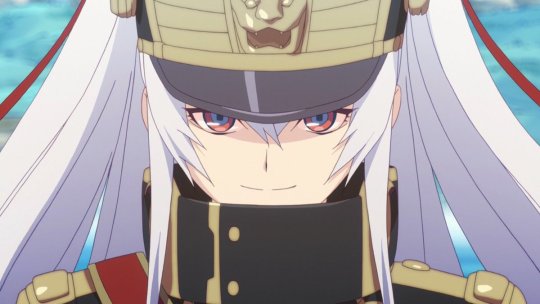
And that’s really cool, and shows a real understanding of how storytelling has morphed thanks to the instant and collective communication the internet has. It also shows the negative side effects has- the reason Altair wants to destroy the world is because Setsuna- the one who had the idea for her first place-was driven to suicide by the cyber-bullying and harassment she got as a writer and artist. So Altair’s here to take revenge for her author.
Again, REALLY cool and impactful concept for a story, something that really cuts to the heart of issues creators face in the internet age. And when it comes down to it I think the main issue of the anime is how it fumbled in telling that story. Basically, they felt the need to filter Altair and Setsuna’s story through the lens of a Bland Male Protagonist and that ruined everything. Setsuna’s story was told the point of view of her male friend who felt all guilty because he got jellus of Setsuna for being a more successful creator than him and stop talking to her and he feels that contributed to her suicide and YAWN I really don’t care about his manpain.

Basically, because of this filter, we don’t learn that much about Setsuna as a person, or Altair’s inner struggle, or the relationship between Altair and Setsuna. This makes the actually-really-cool-high-concept ending to their story have a lot less emotional impact than it should.
Seriously, this show well done and interesting resolution to its central conflict(so cool I screencapped it for imgur to show my gf. You can see it here.) It just...wasn’t built up to properly at all. It’s an ending that depends of Altair and Setsuna, but they were barely characterized throughout the show, so it falls flat- and that’s such a shame, because it is the kind of ending that DESERVES strong characters behind it.
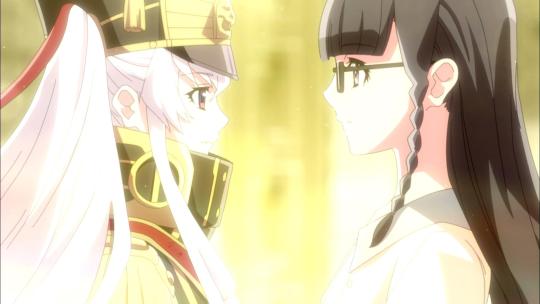
I know it’s very easy to say this is “how I would have written” a story after the fact, hindsight being 20/20 and all, but if I’m going to tell you anyway. I would have written this story from Altair’s point of view. I’d have shown Setsuna’s struggle and her suicide from the point of view of the character she created. I’d have Altair enact her plan to destroy the world on her authors behalf, but at the same time she’d be using it as an opportunity to find out more about her author’s life.
She’d spefically attack Setsuna’s friends and loved ones who abandoned her and demand to know why they did what they did to her creator. Rather than it just be one boy manpaining over everything, I’d make it so Setsuna had a couple different writer friends and family members who treated her badly due to jealousy or insecurity over her success, and Altair’s encounters with them, where she used their favorite characters to bring them down, would have been central to the anime.

The story would have been so much more effective if it had actually focused on the characters who were at the center of everything. Instead it just ended up being a show with really good concepts and cool meta shit, but one that didn’t use it’s full potential in executing those concepts, and kind of threw the concept of “characterization” in the trash.
The show has a lot of meditative thought on writing, from the dark side of it- the struggle, the tears, the weird relationships creators have with fans- to the positive impact and powers of stories. “A story has the power to save someone” was a line in the show. As a writer I found it all very moving.
Unfortunately, though, as good as Re: Creators is with concepts- as good as it is when it comes to how it TALKS about characterization and writing and all that, the writing and characters on the show are actually pretty weak. It’s kind of hilarious that a story about the power of writing, a story that does this whole spiel about how the audience needs to be invested in a story for it work....also forgets basic things like “show, don’t tell” and “don’t include more characters than your story can handle” and “carefully build up your character arcs”.

This is an anime that would have benefited GREATLY from having less characters. We’ve got a huge sprawling cast and none of them are developed properly. Altair should have been a great character, but up until the very last episode she was basically a very 2D villain, alternately stoic or cackling, only to suddenly have this emotionally moving finale which would have been way more effective if the show had built up to it properly and explored her point of view more.
The show tended to communicate the character motives, backstories, feelings etc through boring exposition rather than showing them. A good demonstration of this is when one of the characters is making this heartfelt appeal and her writer says knowingly “she’s talking about her dead childhood friend”. OKAY THANKS. WHY SHOULD WE CARE. We don’t know this childhood friend, we don’t know anything about her story. Having a character randomly say “this is Significant” doesn’t make it actually significant.
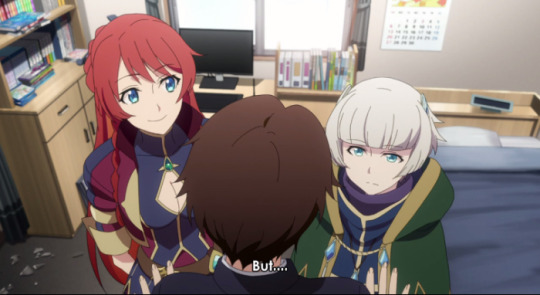
Honestly it seems such a waste to have characters coming from all different kinds of stories and never showing what their stories they came from are LIKE, aside from a few extremely brief flashes. Ideally, this show would have cut to scenes from their stories, each in a unique art style, and got us involved in where these characters were coming from.
They have characters who TALK about having relationships and feeling all these emotions with these various other characters, but we never see them. One character came from a brutal dark fantasy and is all mad because of that, but the show never shows us a full scene of the story she came from. Who did she lose? What horrible things happened to her?

This really ended up badly hurting the show at a key points- and example is when the main female action hero’s mentor shows up to fite her, it’s supposed to be this big dramatic twist but it makes zero impact because we know nothing about this dude other than she’s mentioned liking him a couple times. The show quickly tells us he feels world weary or whatever and that’s why he’s opposing her and then they have a big fight. But the fight is not going to have any emotional punch if the very REASON for it is just stated hurriedly and randomly at the last second, if this relationship and character have basically no foundation. The anime needs to show the audience actual scenes that demonstrate and build these characters’ relationship, show this mentor character worn getting down by life, at least give us SOMETHING.
If the cast had been cut in half and if they’d given each character the time and care they deserved, this show could have been something really great. But it ended up focusing more on boring government meetings and dull explanations of the battle mechanics.
For a show that focused on writers interacting with the characters they’d written, it didn’t seem to care about its characters all that much when it came down to it. This stung especially because a few of them had some really good potential that was promptly wasted in a needlessly cruel way.

An example of this was the bond between this dark fantasy knight lady (Alicetaria) and a Precure-style magical girl (Mamika). It was one of the highlights of the show for a while and I was pleasantly surprised a show like this was paying so much attention to the friendship between two female characters- then I realized that, the way this show was going, the fact these two characters were getting any attention at all had to be because one of them was going to get killed off so the other character could swear vengeance and yada yada cheap drama.
GUESS WHAT, I WAS RIGHT. And it was even stupider and more manufactured than I expected- Mamika got killed in a totally idiotic way that was the show basically saying “LOOK her magical girl ideals are SO NAIVE she believed she could solve things with friendship and kindness but it just got her BRUTALLY MURDERED” (wow so edgy this has never been done before OH WAIT IT’S BEEN DONE TEN BILLION TIMES will these grown-ass men ever get tired of shitting on shows for little girls for daring to be optimistic and hopeful?)

And the most untrustworthy character on the show just HAPPENED to witness Mamika’s death and then for some reason Alicetaria believed this VERY OBVIOUSLY untrustworthy source when she said it was one of the good guys had killed Mamika and attacked the good guys. It was all so goddamn manufactured and pointless and accomplished nothing.
It led to some storyline where Alicetaria became a double agent and tried to bring down the bad guys from within that ALSO went absolutely nowhere- she didn’t like, weaken their team or get valuable intel or anything, she had no apparent strategy, and the villain knew about her plan the entire time. So she just ended up being killed off like a chump. So, this story about respecting the characters you create...had its character be unbelievably stupid for cheap drama and gave them utterly meaningless deaths. Nice.

Mamika in general deserved a lot better. The idea of a kids show character entering the real world and experiencing shock that things work differently is a cool concept. I liked the scene where Mamika was horrified her attacks made someone bleed because there’s no blood on her show. But I think that sort of story can be told without shitting all over the idealism of kid’s shows. It would have been a much more interesting story if Mamika survived and struggled to maintain her idealism in this harsh world. If it was tested time and time again and she lost hope and broke down and got angry, but in the end realized the world of kindness she wants is still worth fighting for. Killing her off is the absolute laziest way to go about it.
(Also the fact Mamika violently attacked a character who disagreed with her for no apparent reason and this was condemned as if it was something endemic to the magical girl genre made me think whoever wrote that ep had never seen Precure, even though that’s what she clearly based on. Magical girls, especially Precure style ones, don’t attack first and ask questions later. They try to reason with their opponents and don’t fight unless they are attacked or others are attacked. A Shonen hero might respond violently to someone arguing with them/ consider physical fighting the best way to solve a problem, but a magical girl never would. Sorry just a PET PEEVE I had as magical girl fan).

Sigh. I’m glad I watched Re: Creators. It was really moving in how it discussed writing. The ending was very good, even through it wasn’t built up to properly. How it wasted so much of its characters and ideas makes me really sad, but it also inspires me. I want to think of something like these concepts and execute it in a way that satisfies me. And that’s really what Re: Creators was all about- the power stories have to inspire.So while it was a very flawed show I have incredibly mixed feelings about, in a way, it did its job, and I commend it for that.
#re: creators#re creators#summer 2017 anime#anime overview#altair#alicetaria february#magical slayer mamika#setsuna shimazaki#shimazaki setsuna#gifs#this is a LONG post#suicide cw
77 notes
·
View notes
Note
A/B/O world where Bs are a neglected minority (A45/B10/O45), even if they're some of the most important members of society. Because Bs are immune to pheromones. Stiles is a B undercover spy. On a mission, Stiles poses as A/O (with fake pheromones, gotta love the R&D) and gets chosen by A/O Peter, who has issues with normal dynamic stereotypes (O's are airheads, A's are controlfreak douches) and Stiles doesn't set his hackles up like all the others. And Stiles just wants to complete his mission.
Worse than worse.
Peter is so, so tired right now. He has been for a while, actually. Of society, his family, his circumstances. So. Very. Tired.
The last thing he wanted was to have to attend a ball that will leave him with the same sour taste in his mouth as always in the end. Arrogant alphas, simpering omegas, all of them slaves to their own hormones and pheromones and no better than animals. No amount of alcohol can wash the foul taste that's already building in his mouth, barely one hour in.
Sadly, he had no say in the matter and here he is.
Then he spots him. He doesn't know what makes him pay attention, but he's glad anyways. The man is gorgeous, but that's not what catches his attention. What makes Peter giddy is the way he manipulates the alpha in front of him into snapping so badly that security sweeps in. Then the man feigns being horrified when Peter is sure he's ecstatic. It's beautiful and, since Peter has never been one to abstain from what he wants, he tells him so.
"So beautiful," Peter drawls and then he has to contain a delighted laugh when the man turns, a spark in his eyes that says that he's ready to destroy Peter.
Suddenly, Peter is not tired at all.
---
He called it.
Stiles fucking called it.
Did he say that loud enough for the ones in the back?
No?
HE CALLED IT.
There.
When he eventually gets out, he's going to repeat that until he loses his voice. And then he'll write it down, make copies of it and shove it in their faces. He'll let them keep their copy. Hell, he'll even frame it for them. The remaining copies will be stuck around the office, toilets included.
Because he called it, fuck dammit.
He said the mission was going to be the worst thing ever, and, just as he expected, this mission has turned out to be the worst thing ever. What's worse than the worst thing ever? Is that a thing? It has to be. Because once Stiles had to spend an entire week in the sewers and that was supposed to be the perfect example of the worst thing ever. And yet this is worse. So there must be a term whose definition is "worse than the worst thing ever".
And the mission isn't even over yet.
From bad intel to really bad luck, everything that could go wrong has gone epically wrong. (There's a horse hoof-shaped burn on Stiles' butt that's stinging like crazy, that's how bad the whole thing has gone! A hoof-shaped second degree burn! Stiles will have a hoof tattoo-like mark on his butt for who knows how long, fuck dammit!) Stiles is going to kill the intel and development people, he doesn't care if Danny or Lydia get pissed off for Stiles destroying their respective departments. This shit calls for retribution! The equipment failed, the intel was wrong, they deserve anything Stiles dishes out. Everything went wrong because of them!
Ok, fine, not exactly all. He's already gotten what he needed from his target's computer... even after said computer's OS crashed and nearly caught on fire. Physically. As in flames coming out of... Ok, whatever. Let bygones be bygones and all that shit. Stiles, hoof-shaped second degree burn on his ass cheek or not, needs to chill. He has the data and that's all that matters.
Now, he just has to figure how to send said data to base and then beat it. That would be wonderful. But, of fucking course, because this mission is the worst of the worst things ever, something is jamming the signal, which has made him lose contact with his handler and he hasn't been able to transfer it to headquarters. Sadly, that means that he has had to transfer the data to a memory stick (after having to patch the damn thing that was just seconds ago on fire with what he had in his pockets) and now he has to physically carry it outside the building. Which is no good but he'll have to make do.
He's taking a vacation after this.
(After making intel and development pay, that is.)
---
Just... fuck his life, ok?
His partner was able to slip out unnoticed but as he was trying to do the same, security showed up out of nowhere and he had to retreat towards a toilet or risk being caught otherwise. And sadly, an atypical and abrupt increase in security can only mean one thing: the breach has already been found out and they're trying to locate the source.
Maybe Stiles hasn't mentioned this before, but he really, really hates this mission.
(He has.)
(Like at least twenty times over the comms before he found himself alone.)
(After that he's been chanting it in his head.)
It's already been twenty minutes since that happened and he hasn't been able to leave yet, which just adds up to the shit-ton of things that have gone wrong in this operation so far. Right now, his only consolation for all his troubles is that Deaucalion and every single member of his merry band of human waste are going to be drawn out handcuffed in broad daylight when the bosses finally get their hands on the intel Stiles is carrying right now.
But first he has to leave this fucking place, dammit.
Which, again, brings him to his current situation, in which he's stuck in a ballroom, trying to make an alpha completely lose his shit out of sheer irritation and enjoying every second of it despite the dire circumstances. Now, Stiles would normally try to curve his vindictiveness when he's posing as an omega, but in his defense this alpha was asking for it. Begging. On his metaphorical knees even.
If there's a word Stiles despises, it's defective, with unnatural or it's various synonyms right after it on the podium. Especially so if they're being used to describe another human being. They get his hackles up and his level of viciousness goes first through the roof and then the stratosphere. Easily.
When he was a teen he would even get violent, but time (and the anger management therapy the State of California, his crying omega mom and disappointed™ alpha dad forced on him) toned down his knee-jerk reaction to those words. Don't get him wrong, his view on the whole thing is still pretty much the same, he has just learned to dish out his response in a much more undetectable and productive way.
Because, by definition of the majority of the population nowadays, Stiles himself is defective and unnatural. Doctors have tests to know it before babies like Stiles are born so that the parents can knowingly decide if they still want to have a Beta child or not. In some parts of the world people like Stiles are sacrificed, in others they have to be terminated before they're even born or face being persecuted and killed along with the parents that dared to defy the law and had them. Never mind that if an Alpha, an Omega and a Beta are examined side by side, physically speaking they are almost identical. The only thing that's different is that Betas can't produce any of the two kinds of pheromones or smell them when they're being emitted. That's it. The rest of their bodies work just fine. They have to eat, drink and sleep to survive just like everyone else. If they are female, they are perfectly able to get pregnant; if they are male, they can impregnate a woman. Just like every Alpha or Omega on the planet.
But again, since Betas lack of the equipment to process pheromones, don't go into a heat or a rut, and lack those instincts associated with them, they are defective. Hell, the very term "beta" is a slur that comes from the programming slang (first version of a program that has the necessary basics for it to run but it's incomplete). Betas may have made it their own, but that doesn't change its origins. That's the kind of world Stiles lives in.
And this asshole Alpha, who apparently also finds Omegas utterly vapid and vexing, has packed more Beta slurs in the twenty minutes Stiles has been there blending in than what he can stomach without popping a vessel if he doesn't answer somehow.
Admittedly, Stiles was running on a short fuse to begin with, but he knows he would have done this anyways because it may provide the necessary distraction to slip out unnoticed.
And no one beats Stiles at being an asshole, so by now he has lost count of the number of times he's had to bite his cheek and mask his glee covering his face coyly with his flute of champagne to avoid giving himself away. Asshole Alpha looks about ready to give in to the temptation of strangling him and it shouldn't be this amusing, but it is. Immensely so, in fact. Especially since Stiles is keeping up the hare-brained and innocent act flawlessly and drawing every single omega in the vicinity into the conversation, thus managing to crowd Asshole Alpha quite effectively.
A small pleasure in a completely shitty situation, that's exactly what this is. Now, if he could just leave somehow... But no, impossible. Security is still at every door and Stiles has no way of getting out without being caught with the memory stick and photographic evidence he has on himself.
Asshole Alpha finally snaps and lets out a threatening growl. Stiles forces himself to back off frightened instead of snickering delightedly, copying the reaction of every Omega around himself down to the distressed whimpers at the (he guesses by the reaction) onslaught of angry pheromones. Two guards swoop in almost immediately and make the man accompany them. He resists the temptation of waving cheekily at him as they drag him out and joins the horrified and appalled whispering left behind instead.
"So beautiful," someone drawls at his back and Stiles bites back an irritated groan before turning around to look at most possibly Asshole Alpha, take two.
His breath catches slightly when he takes in the new Alpha's appearance. Ok, wow. Asshole or not, that's one fine specimen of a man. Like, top model worthy wow. Stiles never thought he'd see anyone other than Tony Stark (who cares if it's a fictional character?) who would do justice to a goatee, but holy shit.
What. He may hate people and the dynamics they're run by, but that doesn't keep him from appreciating eye candy, ok? That's a completely different matter, after all. Also, eye candy or not, Stiles will destroy him anyways if he's a douche. It will even be sweeter, because good looking alphas are the epitome of privilege and the thought of being played by an Omega doesn't even enter the realm of possibilities for them.
"Hi," he chirps sweetly, looking at him through his eyelashes and tilting his head just so. Alpha's smile widens and Stiles fights a smug smirk. He's going to destroy him.
"Hello," Alpha purrs. "My name's Peter."
10 notes
·
View notes
Text
If he could see you in this dress (Poe Dameron x Female Reader)

Title: If only he could see you in this dress
Length: 1400 words
Genre: Fluff
Rating: T
Summary: As an intelligence officer in The Resistance, you get some pretty fun outfits, and one dress you feel like may just finally get Poe to make a move. (Female reader)
A/N: So this is my first fic ever. Go easy on me. :) I’m trying to be more vulnerable in the world, and this was one of those things on my list. Much thanks to @warqueenfuriosa @mell-bell @fandom-writes and @charliexowrite for all the encouragement to get it started.
You and Poe. Poe and you. It’s been...complicated.
You weren’t in an established relationship or anything, but there had to be something more than just friendly colleagues. The glances to each other that lasted just a little bit too long. The not-so-casual brush of your arm against his. The small laughs you shared after meetings with General Organa.
But you were committed to the cause. You’re an intelligence officer. He’s the best pilot in The Resistance. This would have to be the most you ever became romantically involved with Poe. You were always so disciplined, so strict. Putting your emotions or personal relationships aside was usually so easy. It killed you to not have that kind of relationship with another human, but that wasn’t the priority in your life.
Why couldn’t you seem to get away from your feelings for Poe? Sometimes you took the long way back to your quarters just to see if he was working on his X-Wing. He wouldn’t even see you. You just wanted to see him. Keep an eye on him.
You also noticed he had started to come around more often when you’d be eating. Was he following you? Surely not. He probably was just on a new schedule, or found that Rey or Finn were available at that time.
Then the voice in the back of your mind whispered, “Then why does he keep looking at you? Staring at you even?”
Ugh, those eyes. You could get lost in them all day. Deep, rich chocolate eyes.
Today you had to focus. Poe had been away for a couple of weeks, which meant your mind would wander to him more frequently as the time went on. You wondered where he was. Was he safe? Your heart pounded faster. What if he’s in danger.
Being an intelligence officer had its perks. For example, you had a higher clearance, which meant you could access more information on your datapad. Like where Poe is. And whether he’s okay. You tried not to check too frequently, but now that it had been over 3 weeks, you started checking nearly every hour. The report said the mission should only take a week.
Snapping back into reality from a knock at the door, and your team was there to help you get ready for your mission. One woman, a seamstress, pulled out a long, form fitting dress, and another had a bag with jewelry and shoes. Both are enthusiastic at how absolutely stunning you’re going to look. “Even the First Order will be impressed with this fashion,” the seamstress emphasizes. You both hated and loved these missions, you felt like you were playing out a fantasy sometimes, as though there was no danger. You were the spy getting the intel at a fancy party held by the First Order. It was much sexier than other intel missions, but it also meant any slip up and you could face being kidnapped in a heartbeat.
The women helped get the gown on you, a long black dress, which revealed nothing in the front but your shoulders, but in the back, revealed the long curve of your spine through glittering transparent fabric. Quickly, your mind went elsewhere.
I haven’t checked where he is for a few hours. Maybe Poe will be back by the time this mission is over in a few days.
What if Poe saw me in this dress? What if I was wearing this for him, not for The Resistance?
You blushed at your own inner conversation thinking about what Poe may think when he saw you. You closed your eyes as the women made the final adjustments to the gown and jewelry. One woman handed you a small clutch, and you left your quarters to leave.
Walking quickly and ignoring the stares from others, you made your way through the halls going over the details General Organa told you--who would be there, what to ask, what not to say. You needed to hear one detail: any mention of what was coming next and without suspicion gather any detail on what was being planned after Starkiller Base was destroyed.
General Organa met you at the landing pad, ensuring everything was ready for you, triple checking that you were ready. Without your knowledge, someone else was watching the two of you talk.
Poe had just come back from his mission drained, exhausted, and ready to debrief as quickly as possible so he could get a moment of peace. “Beebee, let’s go see the General.” He turned his head seeing the General, but something else took over his mind. Your back was turned to him, but he could still see the profile of your face. His breath caught in his throat as he saw you across the landing pad. “Dameron, cut it out,” he said to himself.
He couldn’t stop staring. And General Organa noticed. He quickly turned his gaze away and quickly climbed down the ladder, BB-8 joining him.
“I’m so sorry General, I left something in my quarters, I’ll only be two minutes,” you explained hastily, embarrassed you had forgotten your clothes to change out of after the mission. You walked through the halls, not realizing Poe was following you.
“Good luck, F/N.” His voice was low and tired, which meant it was deeper than normal. Sexier than usual. Your stomach did a somersault.
Startled, you quickly turned around to find that he had entered into your quarters and was between you and the door, resting against the door frame. Even after a long mission exhausted and injured, Poe was still Poe. That confident, cocky Poe. One foot crossed over the other at the ankle with a grin on his face. He looked banged up, but not too bad--a bruise was beginning to form on the edge of his eyebrow and there was a cut on his lip. You let yourself look at his lips, those full and smug lips, for just a little too long.
“Oh, thanks,” you replied as casually as possible. Nothing was different. Right? I’m just wearing an incredibly revealing dress. That’s all. It’s normal.
He didn’t move. He drank in the sight of you as your cheeks began to burn, hoping that you weren’t blushing too much. He watched as you grabbed the remaining items from your quarters, putting them into a bag and slinging it over your shoulder. He licked his lips.
“Um, I need to head out, did you need anything? I’m glad to see you made it back. I was a little worried after all. You said your mission wasn’t going to take but a week.” You rushed your speech, trying to give him an opportunity to leave. You didn’t know where to stand. Near the door? Near him? You had to leave soon.
He didn’t answer. Looking away, you weren’t sure what to do. No, you know what to do, Y/N. Let go. Pretend you’re wearing that dress for him.
Walking over to him, you let your bag fall from your shoulder. You placed your hands on his face, thumbing over his broken lip to see if he the injury would impact your move. He didn’t wince. Good. He smirked and began to say something when you pressed your lips against his. At first, it was a chaste kiss, but you melted as he quickly and intensely began kissing you back. You felt his hands softly on your waist pulling you closer to him.
The warmth of his body was overwhelming in combination with the movement of his lips. His lips soft, yet the kiss urgent. As he began to kiss you harder, you parted your lips letting his tongue quickly dart across your lips and into your mouth. You heard him moan softly.
Despite everything you were thinking, you pulled away from him, grabbed your bag and opened the door. He looked confused, even hurt. He looked down at the floor and moved aside to let you through.
“I have to go. I’m already late.” You continued, “but if you’re patient, maybe you can see me again in this dress before I have to return it.”
He looked up and smirked knowingly. “That sounds like a deal.” And with that, you left Poe behind, walking down the hall and smiling, knowing he was appreciating the view.
#poe dameron#poe dameron x reader#first fic#this is terrifying#but kind of cool#damn that single curl#the last jedi
158 notes
·
View notes
Text
Hannigram, forced m/m relationships, and abuse
I had some thoughts about the post making the rounds in Hannigram-land, but I honestly don't want to feed the trolls with reblogs. You can read it here. Fair warning: in this discussion, you will find heteronormativity, homophobia, and discussion of abusive relationships. I will be incorporating my own personal experience with these topics as well.
I’m so tired of Tumblr taking literally any two guy relationship & turning into some gay fetish. ANY guy relationship. Even those that aren’t even platonic, or abusive relationships there is ALWAYS some group of assholes here that turn into what is a fetishized gay romance... Hannibal & Will was forced, was insanely abusive & murderous.
I'm so tired of Hollywood feeding me stories about any man and any woman, and expecting me to care about their romance. It seems like fifteen minutes of screen time is all one needs to make it obvious that they're made for each other and should be together forever.
Slash and yaoi fandom was the first place that gave me an alternative, and I will love them forever for that. I grew up deep in the South and never knowingly met a queer person until my friends and I started coming out to each other. The only queer people I could think of were Ellen, Ru Paul, and Elton John—and this is during that dark period between Ellen losing her sitcom and becoming the household name she is today. For years, I only heard about her in terms of her “deviant” sexuality.
I discovered slash fandom around the time I hit puberty, and seeing positive examples of queer relationships allowed me to speculate on my own sexuality. Slash fandom allowed me a glimpse into a world where queer sexuality was not just normalized but celebrated.
(Cut because this shit got long.)
Think of how radical that was for someone who had never met a queer couple in real life, had never seen a Pride parade or lived near a gay club. Better yet, for someone who lived near a military base under Don't Ask, Don't Tell—even if I had known queer adults, they could never have talked about it.
Beyond my own experience, let's also consider how actual queer relationships have been treated in film and literature. So many times, obvious queer relationships have been written off as close friendships. Hollywood has a long history of coding queer characters with subtle references meant to evade heterosexual viewers, a wink and nod approach to representation. I won't go into detail because other authors have discussed this topic with more skill than I can approach. Consider watching The Celluloid Closet for an introduction.
In some ways, slash fandom is allowing queer audiences to take back what was theirs all along. And if there are a lot of heterosexuals along for the ride, the more the merrier. Straight women and men have their own reasons for loving slash, and it's not just “fetishization.”
Now, on to Hannigram. Others have already established that Hannigram isn't a “forced” queer romance but a canon one. Note the element of queer erasure: “Just because Will asked if Hannibal is in love with him and tried to kill everyone who could possibly compete with him and then they embraced on a cliff while looking deeply into each other's eyes, lips inches apart, and went over the edge... doesn't mean it's gay.” And that's without going into Hannibal leaving his broken heart for Will to find, or the gratuitous references to Achilles and Patroclus.
Once we've gotten past that and acknowledge that yes, everyone up to Bryan “I have Hannigram snails on my laptop” Fuller acknowledges it's queer, the next argument is, “but it's abusive!”
And an abusive relationship should bother me. Story-time: once upon a time, I thought I met the love of my life. She wined me, dined me, told me sweet things about myself, and promised to keep me safe. Then she proceeded to manipulate, gaslight, and eventually physically attack me. We were together for about two years. I do not remember that time with any fondness. All I feel is disgust and a sense of unreality. Some genuinely nice things happened during those two years, but really, anything good was drowned out by her disregard for my autonomy as a person.
In short: I hate abusive relationships, but I love Hannigram. That doesn't feel like a contradiction.
The world of Hannibal is a very dark place. Monsters like Mason Verger walk among us, destroying with impunity, and even sweet girls like Abigail Hobbs have dark secrets. Nearly every character exploits, manipulates, or murders someone else. Including Will Graham. He pets Frederick Chilton like a prized dog, knowing what will very likely happen to him when Francis Dolarhyde sees. He sympathizes with serial killers more than their victims, often defending their work and their motivations to his colleagues. He plays Hannibal like a fiddle, and he could have gotten through Mizumono intact if not for the slightest hint of Freddie's perfume on his skin. He knew exactly how risky that game was.
Hannibal is a dark place, and I think as viewers it taps into an aspect of psychology known as l'appel du vide, “the call of the void” that makes us want to jump when faced with a cliff. Darker fiction lets us jump without being hurt, lets us explore those sinister corners of our consciousness in a safe, fictional environment.
Will's relationship with Hannibal is strange and complicated. Hannibal does some monstrous things: gaslighting, framing him for murder, eviscerating him, killing his friends, and nearly killing him, repeatedly. If Will were a real person, I would tell him to head for the hills. But Will is a fictional character, and an incredibly fucked up one. When he sees Hannibal “Dolce,” he seems incredibly happy. And also ready to stab Hannibal, because for them, loving and stabbing are pretty much the same thing.
I think that's what sets Hannigram apart from a plain abusive relationship for me: Will has the same murderous potential under his skin. Hannibal is trying to set it free, and also fucking up along the way because he has no idea what to do with these emotions Will has engendered.
It's not healthy. Bryan Fuller has not written us a how-to manual for relationships. But it is in many ways beautiful, and dangerous, and possibly the best Hannibal or Will is capable of.
8 notes
·
View notes